
flo-ai
🔥🔥🔥 Simple way to create composable AI agents
Stars: 102
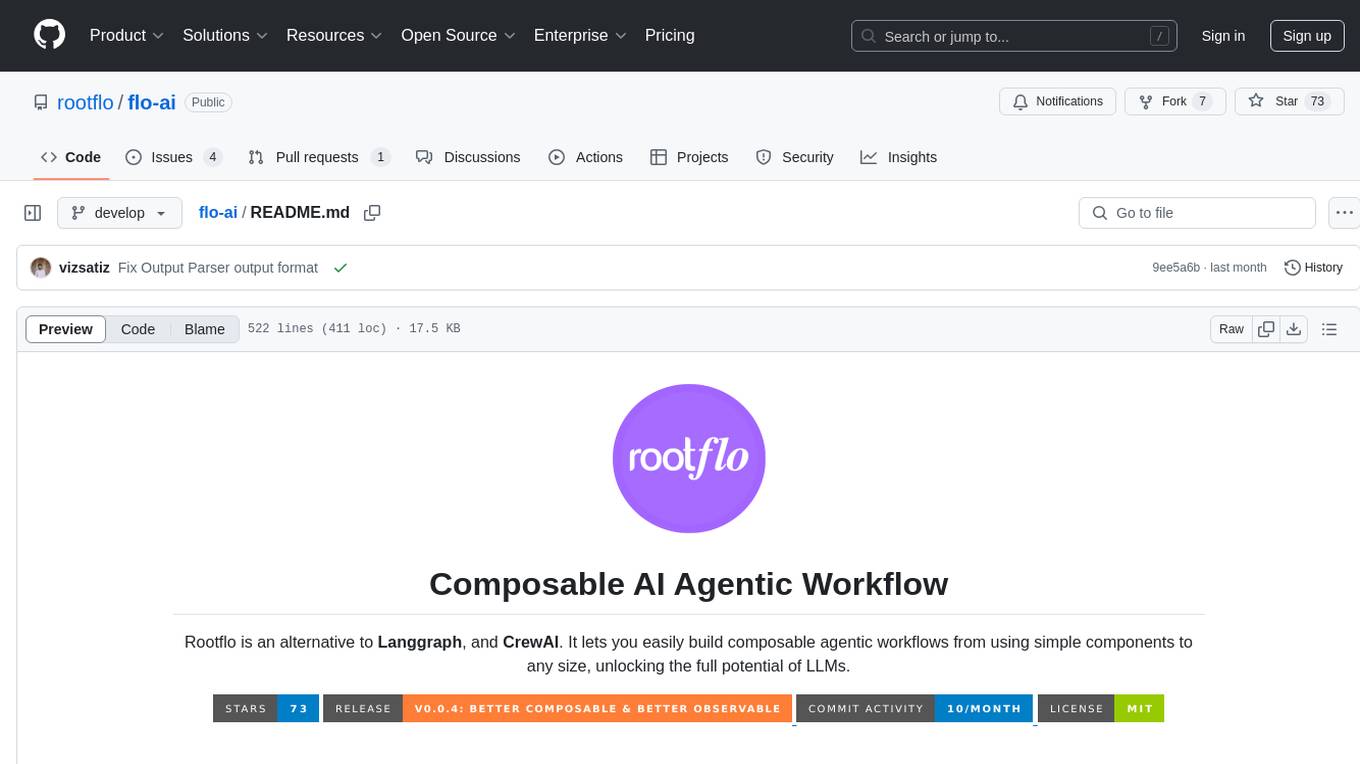
Flo AI is a Python framework that enables users to build production-ready AI agents and teams with minimal code. It allows users to compose complex AI architectures using pre-built components while maintaining the flexibility to create custom components. The framework supports composable, production-ready, YAML-first, and flexible AI systems. Users can easily create AI agents and teams, manage teams of AI agents working together, and utilize built-in support for Retrieval-Augmented Generation (RAG) and compatibility with Langchain tools. Flo AI also provides tools for output parsing and formatting, tool logging, data collection, and JSON output collection. It is MIT Licensed and offers detailed documentation, tutorials, and examples for AI engineers and teams to accelerate development, maintainability, scalability, and testability of AI systems.
README:
Flo AI is a Python framework for building structured AI agents with support for multiple LLM providers, tool integration, and YAML-based configuration. Create production-ready AI agents with minimal code and maximum flexibility.
Checkout the docs »
Github
•
Website
•
Roadmap
Build production-ready AI agents with structured outputs, tool integration, and multi-LLM support
Flo AI is a Python framework that makes building production-ready AI agents and teams as easy as writing YAML. Think "Kubernetes for AI Agents" - compose complex AI architectures using pre-built components while maintaining the flexibility to create your own.
Create AI workflows visually with our powerful React-based studio!
Flo AI Studio is a modern, intuitive visual editor that allows you to design complex multi-agent workflows through a drag-and-drop interface. Build sophisticated AI systems without writing code, then export them as production-ready YAML configurations.
- 🎯 Visual Design: Drag-and-drop interface for creating agent workflows
- 🤖 Agent Management: Configure AI agents with different roles, models, and tools
- 🔀 Smart Routing: Visual router configuration for intelligent workflow decisions
- 📤 YAML Export: Export workflows as Flo AI-compatible YAML configurations
- 📥 YAML Import: Import existing workflows for further editing
- ✅ Workflow Validation: Real-time validation and error checking
- 🔧 Tool Integration: Connect agents to external tools and APIs
- 📋 Template System: Quick start with pre-built agent and router templates
-
Start the Studio:
cd studio pnpm install pnpm dev -
Design Your Workflow:
- Add agents, routers, and tools to the canvas
- Configure their properties and connections
- Test with the built-in validation
-
Export & Run:
# Export YAML from the studio, then run with Flo AI python -c " from flo_ai.arium import AriumBuilder builder = AriumBuilder.from_yaml(yaml_file='your_workflow.yaml') result = await builder.build_and_run(['Your input here']) "
- 🔌 Truly Composable: Build complex AI systems by combining smaller, reusable components
- 🏗️ Production-Ready: Built-in best practices and optimizations for production deployments
- 📝 YAML-First: Define your entire agent architecture in simple YAML
- 🧠 LLM-Powered Routing: Intelligent routing decisions made by LLMs, no code required
- 🔧 Flexible: Use pre-built components or create your own
- 🤝 Team-Oriented: Create and manage teams of AI agents working together
- 🔄 Langchain Compatible: Works with all your favorite Langchain tools
- 🚀 Quick Start
- 📝 YAML Configuration
- 🔧 Variables System
- 🛠️ Tools
- 🧠 Reasoning Patterns
- 🔧 LLM Providers
- 📊 Output Formatting
- 🔄 Error Handling
- 📚 Examples
- 🚀 Advanced Features
- 🔄 Agent Orchestration with Arium
- 📖 Documentation
- 🌟 Why Flo AI?
- 🎯 Use Cases
- 🤝 Contributing
- 📜 License
- 🙏 Acknowledgments
pip install flo-ai
# or using poetry
poetry add flo-aiimport asyncio
from typing import Any
from flo_ai.builder.agent_builder import AgentBuilder
from flo_ai.llm import OpenAI
from flo_ai.models.agent import Agent
async def main() -> None:
# Create a simple conversational agent
agent: Agent = (
AgentBuilder()
.with_name('Math Tutor')
.with_prompt('You are a helpful math tutor.')
.with_llm(OpenAI(model='gpt-4o-mini'))
.build()
)
response: Any = await agent.run('What is the formula for the area of a circle?')
print(f'Response: {response}')
asyncio.run(main())import asyncio
from typing import Any, Dict, List, Union
from flo_ai.builder.agent_builder import AgentBuilder
from flo_ai.tool.base_tool import Tool
from flo_ai.models.base_agent import ReasoningPattern
from flo_ai.models.agent import Agent
from flo_ai.llm import Anthropic
async def calculate(operation: str, x: float, y: float) -> float:
if operation == 'add':
return x + y
elif operation == 'multiply':
return x * y
raise ValueError(f'Unknown operation: {operation}')
# Define a calculator tool
calculator_tool: Tool = Tool(
name='calculate',
description='Perform basic calculations',
function=calculate,
parameters={
'operation': {
'type': 'string',
'description': 'The operation to perform (add or multiply)',
},
'x': {'type': 'number', 'description': 'First number'},
'y': {'type': 'number', 'description': 'Second number'},
},
)
# Create a tool-using agent with Claude
agent: Agent = (
AgentBuilder()
.with_name('Calculator Assistant')
.with_prompt('You are a math assistant that can perform calculations.')
.with_llm(Anthropic(model='claude-3-5-sonnet-20240620'))
.with_tools([calculator_tool])
.with_reasoning(ReasoningPattern.REACT)
.with_retries(2)
.build()
)
response: Any = await agent.run('Calculate 5 plus 3')
print(f'Response: {response}')import asyncio
from typing import Any, Dict
from flo_ai.builder.agent_builder import AgentBuilder
from flo_ai.llm import OpenAI
from flo_ai.models.agent import Agent
# Define output schema for structured responses
math_schema: Dict[str, Any] = {
'type': 'object',
'properties': {
'solution': {'type': 'string', 'description': 'The step-by-step solution'},
'answer': {'type': 'string', 'description': 'The final answer'},
},
'required': ['solution', 'answer'],
}
# Create an agent with structured output
agent: Agent = (
AgentBuilder()
.with_name('Structured Math Solver')
.with_prompt('You are a math problem solver that provides structured solutions.')
.with_llm(OpenAI(model='gpt-4o'))
.with_output_schema(math_schema)
.build()
)
response: Any = await agent.run('Solve: 2x + 5 = 15')
print(f'Structured Response: {response}')Define your agents using YAML for easy configuration and deployment:
metadata:
name: email-summary-flo
version: 1.0.0
description: "Agent for analyzing email threads"
agent:
name: EmailSummaryAgent
role: Email communication expert
model:
provider: openai
name: gpt-4o-mini
settings:
temperature: 0
max_retries: 3
reasoning_pattern: DIRECT
job: >
You are given an email thread between a customer and a support agent.
Your job is to analyze the behavior, sentiment, and communication style.
parser:
name: EmailSummary
fields:
- name: sender_type
type: literal
description: "Who sent the latest email"
values:
- value: customer
description: "Latest email was sent by customer"
- value: agent
description: "Latest email was sent by support agent"
- name: summary
type: str
description: "A comprehensive summary of the email"
- name: resolution_status
type: literal
description: "Issue resolution status"
values:
- value: resolved
description: "Issue appears resolved"
- value: unresolved
description: "Issue requires attention"from typing import Any, List
from flo_ai.builder.agent_builder import AgentBuilder
from flo_ai.models.agent import Agent
# Create agent from YAML
yaml_config: str = """...""" # Your YAML configuration string
email_thread: List[str] = ["Email thread content..."]
builder: AgentBuilder = AgentBuilder.from_yaml(yaml_str=yaml_config)
agent: Agent = builder.build()
# Use the agent
result: Any = await agent.run(email_thread)Flo AI supports dynamic variable resolution in agent prompts and inputs using <variable_name> syntax. Variables are automatically discovered, validated at runtime, and can be shared across multi-agent workflows.
- 🔍 Automatic Discovery: Variables are extracted from system prompts and inputs at runtime
- ✅ Runtime Validation: Missing variables are reported with detailed error messages
- 🤝 Multi-Agent Support: Variables can be shared across agent workflows
-
🛡️ JSON-Safe Syntax:
<variable>format avoids conflicts with JSON content
import asyncio
from typing import Any, Dict
from flo_ai.builder.agent_builder import AgentBuilder
from flo_ai.llm import OpenAI
from flo_ai.models.agent import Agent
async def main() -> None:
# Create agent with variables in system prompt
agent: Agent = (
AgentBuilder()
.with_name('Data Analyst')
.with_prompt('Analyze <dataset_path> and focus on <key_metric>. Generate insights for <target_audience>.')
.with_llm(OpenAI(model='gpt-4o-mini'))
.build()
)
# Define variables at runtime
variables: Dict[str, str] = {
'dataset_path': '/data/sales_q4_2024.csv',
'key_metric': 'revenue growth',
'target_audience': 'executive team'
}
# Run agent with variable resolution
result: Any = await agent.run(
'Please provide a comprehensive analysis with actionable recommendations.',
variables=variables
)
print(f'Analysis: {result}')
asyncio.run(main())Variables can also be used in the user input messages:
import asyncio
from typing import Any, Dict
from flo_ai.models.agent import Agent
from flo_ai.llm import OpenAI
async def input_variables_example() -> None:
agent: Agent = Agent(
name='content_creator',
system_prompt='You are a content creator specializing in <content_type>.',
llm=OpenAI(model='gpt-4o-mini')
)
variables: Dict[str, str] = {
'content_type': 'technical blog posts',
'topic': 'machine learning fundamentals',
'word_count': '1500',
'target_level': 'intermediate'
}
# Variables in both system prompt and user input
result: Any = await agent.run(
'Create a <word_count>-word article about <topic> for <target_level> readers.',
variables=variables
)
print(f'Content: {result}')
asyncio.run(input_variables_example())Variables can be shared and passed between agents in workflows:
import asyncio
from typing import Any, Dict, List
from flo_ai.arium import AriumBuilder
from flo_ai.models.agent import Agent
from flo_ai.llm import OpenAI
async def multi_agent_variables() -> List[Any]:
llm: OpenAI = OpenAI(model='gpt-4o-mini')
# Agent 1: Research phase
researcher: Agent = Agent(
name='researcher',
system_prompt='Research <research_topic> and focus on <research_depth> analysis.',
llm=llm
)
# Agent 2: Writing phase
writer: Agent = Agent(
name='writer',
system_prompt='Write a <document_type> based on the research for <target_audience>.',
llm=llm
)
# Agent 3: Review phase
reviewer: Agent = Agent(
name='reviewer',
system_prompt='Review the <document_type> for <review_criteria> and provide feedback.',
llm=llm
)
# Shared variables across all agents
shared_variables: Dict[str, str] = {
'research_topic': 'sustainable energy solutions',
'research_depth': 'comprehensive',
'document_type': 'white paper',
'target_audience': 'policy makers',
'review_criteria': 'accuracy and policy relevance'
}
# Run multi-agent workflow with shared variables
result: List[Any] = await (
AriumBuilder()
.add_agents([researcher, writer, reviewer])
.start_with(researcher)
.connect(researcher, writer)
.connect(writer, reviewer)
.end_with(reviewer)
.build_and_run(
['Begin comprehensive research and document creation process'],
variables=shared_variables
)
)
return result
asyncio.run(multi_agent_variables())Variables work seamlessly with YAML-based agent configuration:
metadata:
name: personalized-assistant
version: 1.0.0
description: "Personalized assistant with variable support"
agent:
name: PersonalizedAssistant
kind: llm
role: <user_role> assistant specialized in <domain_expertise>
model:
provider: openai
name: gpt-4o-mini
settings:
temperature: 0.3
max_retries: 2
reasoning_pattern: DIRECT
job: >
You are a <user_role> focused on <primary_objective>.
Your expertise includes <domain_expertise> and you should
tailor responses for <experience_level> users.
Always consider <priority_constraints> in your recommendations.import asyncio
from typing import Any, Dict
from flo_ai.builder.agent_builder import AgentBuilder
from flo_ai.models.agent import Agent
async def yaml_with_variables() -> None:
yaml_config: str = """...""" # Your YAML configuration
# Variables for YAML agent
variables: Dict[str, str] = {
'user_role': 'data scientist',
'domain_expertise': 'machine learning and statistical analysis',
'primary_objective': 'deriving actionable insights from data',
'experience_level': 'senior',
'priority_constraints': 'computational efficiency and model interpretability'
}
# Create agent from YAML with variables
builder: AgentBuilder = AgentBuilder.from_yaml(yaml_str=yaml_config)
agent: Agent = builder.build()
result: Any = await agent.run(
'Help me design an ML pipeline for <use_case> with <data_constraints>',
variables={
**variables,
'use_case': 'customer churn prediction',
'data_constraints': 'limited labeled data'
}
)
print(f'ML Pipeline Advice: {result}')
asyncio.run(yaml_with_variables())The variables system provides comprehensive error reporting for missing or invalid variables:
import asyncio
from typing import Any, Dict
from flo_ai.models.agent import Agent
from flo_ai.llm import OpenAI
async def variable_validation_example() -> None:
agent: Agent = Agent(
name='validator_example',
system_prompt='Process <required_param> and <another_param> for analysis.',
llm=OpenAI(model='gpt-4o-mini')
)
# Incomplete variables (missing 'another_param')
incomplete_variables: Dict[str, str] = {
'required_param': 'dataset.csv'
# 'another_param' is missing
}
try:
result: Any = await agent.run(
'Analyze the data in <data_source>',
variables=incomplete_variables # Missing 'another_param' and 'data_source'
)
except ValueError as e:
print(f'Variable validation error: {e}')
# Error will list all missing variables with their locations
asyncio.run(variable_validation_example())-
Descriptive Variable Names: Use clear, descriptive names like
<target_audience>instead of<ta> - Consistent Naming: Use consistent variable names across related agents and workflows
- Validation: Always test your variable resolution before production deployment
- Documentation: Document expected variables in your agent configurations
The variables system makes Flo AI agents highly reusable and configurable, enabling you to create flexible AI workflows that adapt to different contexts and requirements.
Create custom tools easily with async support:
from typing import List
from flo_ai.tool.base_tool import Tool
from flo_ai.builder.agent_builder import AgentBuilder
from flo_ai.llm import OpenAI
from flo_ai.models.agent import Agent
async def weather_lookup(city: str) -> str:
# Your weather API call here
return f"Weather in {city}: Sunny, 25°C"
weather_tool: Tool = Tool(
name='weather_lookup',
description='Get current weather for a city',
function=weather_lookup,
parameters={
'city': {
'type': 'string',
'description': 'City name to get weather for'
}
}
)
# Add to your agent
agent: Agent = (
AgentBuilder()
.with_name('Weather Assistant')
.with_llm(OpenAI(model='gpt-4o-mini'))
.with_tools([weather_tool])
.build()
)The @flo_tool decorator automatically converts any Python function into a Tool object with minimal boilerplate:
from typing import Any, Dict, Union
from flo_ai.tool import flo_tool
from flo_ai.builder.agent_builder import AgentBuilder
from flo_ai.llm import OpenAI
from flo_ai.models.agent import Agent
@flo_tool(
description="Perform mathematical calculations",
parameter_descriptions={
"operation": "The operation to perform (add, subtract, multiply, divide)",
"x": "First number",
"y": "Second number"
}
)
async def calculate(operation: str, x: float, y: float) -> Union[float, str]:
"""Calculate mathematical operations between two numbers."""
operations: Dict[str, callable] = {
'add': lambda: x + y,
'subtract': lambda: x - y,
'multiply': lambda: x * y,
'divide': lambda: x / y if y != 0 else 'Cannot divide by zero',
}
if operation not in operations:
raise ValueError(f'Unknown operation: {operation}')
return operations[operation]()
# Function can be called normally
result: Union[float, str] = await calculate("add", 5, 3) # Returns 8
# Tool object is automatically available
agent: Agent = (
AgentBuilder()
.with_name('Calculator Agent')
.with_llm(OpenAI(model='gpt-4o-mini'))
.with_tools([calculate.tool]) # Access the tool via .tool attribute
.build()
)Key Benefits:
- ✅ Automatic parameter extraction from type hints
- ✅ Flexible descriptions via docstrings or custom descriptions
- ✅ Type conversion from Python types to JSON schema
- ✅ Dual functionality - functions work normally AND as tools
- ✅ Async support for both sync and async functions
Simple Usage:
from flo_ai.tool import flo_tool
@flo_tool()
async def convert_units(value: float, from_unit: str, to_unit: str) -> str:
"""Convert between different units (km/miles, kg/lbs, celsius/fahrenheit)."""
# Implementation here
result: float = 0.0 # Your conversion logic here
return f"{value} {from_unit} = {result} {to_unit}"
# Tool is automatically available as convert_units.toolWith Custom Metadata:
from typing import Optional
from flo_ai.tool import flo_tool
@flo_tool(
name="weather_checker",
description="Get current weather information for a city",
parameter_descriptions={
"city": "The city to get weather for",
"country": "The country (optional)",
}
)
async def get_weather(city: str, country: Optional[str] = None) -> str:
"""Get weather information for a specific city."""
return f"Weather in {city}: sunny"📖 For detailed documentation on the
@flo_tooldecorator, see README_flo_tool.md
Flo AI supports multiple reasoning patterns:
- DIRECT: Simple question-answer without step-by-step reasoning
- COT (Chain of Thought): Step-by-step reasoning before providing the answer
- REACT: Reasoning and action cycles for tool-using agents
from flo_ai.models.base_agent import ReasoningPattern
from flo_ai.builder.agent_builder import AgentBuilder
from flo_ai.llm import OpenAI
from flo_ai.models.agent import Agent
agent: Agent = (
AgentBuilder()
.with_name('Reasoning Agent')
.with_llm(OpenAI(model='gpt-4o'))
.with_reasoning(ReasoningPattern.COT) # or REACT, DIRECT
.build()
)from flo_ai.llm import OpenAI
llm: OpenAI = OpenAI(
model='gpt-4o',
temperature=0.7,
api_key='your-api-key' # or set OPENAI_API_KEY env var
)from flo_ai.llm import Anthropic
llm: Anthropic = Anthropic(
model='claude-3-5-sonnet-20240620',
temperature=0.7,
api_key='your-api-key' # or set ANTHROPIC_API_KEY env var
)from flo_ai.llm import Gemini
llm: Gemini = Gemini(
model='gemini-2.5-flash', # or gemini-2.5-pro
temperature=0.7,
api_key='your-api-key' # or set GOOGLE_API_KEY env var
)from flo_ai.llm import VertexAI
llm: VertexAI = VertexAI(
model='gemini-2.5-flash', # or gemini-2.5-pro
temperature=0.7,
project='your-gcp-project-id', # or set GOOGLE_CLOUD_PROJECT env var
location='us-central1' # or set GOOGLE_CLOUD_LOCATION env var
)Prerequisites for VertexAI:
- Set up Google Cloud project with Vertex AI API enabled
- Configure authentication:
gcloud auth application-default login - Set environment variables:
GOOGLE_CLOUD_PROJECTandGOOGLE_CLOUD_LOCATION
from flo_ai.llm import Ollama
llm: Ollama = Ollama(
model='llama2',
base_url='http://localhost:11434'
)Use Pydantic models or JSON schemas for structured outputs:
from pydantic import BaseModel, Field
from flo_ai.builder.agent_builder import AgentBuilder
from flo_ai.llm import OpenAI
from flo_ai.models.agent import Agent
class MathSolution(BaseModel):
solution: str = Field(description="Step-by-step solution")
answer: str = Field(description="Final answer")
confidence: float = Field(description="Confidence level (0-1)")
agent: Agent = (
AgentBuilder()
.with_name('Math Solver')
.with_llm(OpenAI(model='gpt-4o'))
.with_output_schema(MathSolution)
.build()
)Built-in retry mechanisms and error recovery:
from flo_ai.builder.agent_builder import AgentBuilder
from flo_ai.llm import OpenAI
from flo_ai.models.agent import Agent
agent: Agent = (
AgentBuilder()
.with_name('Robust Agent')
.with_llm(OpenAI(model='gpt-4o'))
.with_retries(3) # Retry up to 3 times on failure
.build()
)Check out the examples/ directory for comprehensive examples:
-
agent_builder_usage.py- Basic agent creation patterns -
yaml_agent_example.py- YAML-based agent configuration -
output_formatter.py- Structured output examples -
multi_tool_example.py- Multi-tool agent examples -
cot_agent_example.py- Chain of Thought reasoning -
usage.pyandusage_claude.py- Provider-specific examples -
vertexai_agent_example.py- Google VertexAI integration examples -
ollama_agent_example.py- Local Ollama model examples
from typing import Dict, Any
from flo_ai.tool.base_tool import Tool
async def custom_function(param1: str, param2: int) -> Dict[str, str]:
# Your async logic here
return {"result": f"Processed {param1} with {param2}"}
custom_tool: Tool = Tool(
name='custom_function',
description='A custom async tool',
function=custom_function,
parameters={
'param1': {'type': 'string', 'description': 'First parameter'},
'param2': {'type': 'integer', 'description': 'Second parameter'}
}
)from typing import Dict, Any
from flo_ai.formatter.yaml_format_parser import FloYamlParser
from flo_ai.builder.agent_builder import AgentBuilder
from flo_ai.llm import OpenAI
from flo_ai.models.agent import Agent
# Create parser from YAML definition
yaml_config: Dict[str, Any] = {} # Your YAML configuration dict
parser: FloYamlParser = FloYamlParser.create(yaml_dict=yaml_config)
output_schema: Any = parser.get_format()
agent: Agent = (
AgentBuilder()
.with_name('YAML Configured Agent')
.with_llm(OpenAI(model='gpt-4o'))
.with_output_schema(output_schema)
.build()
)Arium is Flo AI's powerful workflow orchestration engine that allows you to create complex multi-agent workflows with ease. Think of it as a conductor for your AI agents, coordinating their interactions and data flow.
- 🔗 Multi-Agent Workflows: Orchestrate multiple agents working together
- 🎯 Flexible Routing: Route between agents based on context and conditions
- 🧠 LLM Routers: Intelligent routing powered by LLMs, define routing logic in YAML
- 💾 Shared Memory: Agents share conversation history and context
- 📊 Visual Workflows: Generate flow diagrams of your agent interactions
- ⚡ Builder Pattern: Fluent API for easy workflow construction
- 🔄 Reusable Workflows: Build once, run multiple times with different inputs
import asyncio
from typing import Any, List
from flo_ai.arium import AriumBuilder
from flo_ai.models.agent import Agent
from flo_ai.llm.openai_llm import OpenAI
async def simple_chain() -> List[Any]:
llm: OpenAI = OpenAI(model='gpt-4o-mini')
# Create agents
analyst: Agent = Agent(
name='content_analyst',
system_prompt='Analyze the input and extract key insights.',
llm=llm
)
summarizer: Agent = Agent(
name='summarizer',
system_prompt='Create a concise summary based on the analysis.',
llm=llm
)
# Build and run workflow
result: List[Any] = await (
AriumBuilder()
.add_agents([analyst, summarizer])
.start_with(analyst)
.connect(analyst, summarizer) # analyst → summarizer
.end_with(summarizer)
.build_and_run(["Analyze this complex business report..."])
)
return result
asyncio.run(simple_chain())import asyncio
from typing import Any, List
from flo_ai.arium import AriumBuilder
from flo_ai.models.agent import Agent
from flo_ai.llm.openai_llm import OpenAI
from flo_ai.arium.memory import BaseMemory
async def conditional_workflow() -> List[Any]:
llm: OpenAI = OpenAI(model='gpt-4o-mini')
# Create specialized agents
classifier: Agent = Agent(
name='classifier',
system_prompt='Classify the input as either "technical" or "business".',
llm=llm
)
tech_specialist: Agent = Agent(
name='tech_specialist',
system_prompt='Provide technical analysis and solutions.',
llm=llm
)
business_specialist: Agent = Agent(
name='business_specialist',
system_prompt='Provide business analysis and recommendations.',
llm=llm
)
final_agent: Agent = Agent(
name='final_reviewer',
system_prompt='Provide final review and conclusions.',
llm=llm
)
# Define routing logic
def route_by_type(memory: BaseMemory) -> str:
"""Route based on classification result"""
messages: List[Any] = memory.get()
last_message: str = str(messages[-1]) if messages else ""
if "technical" in last_message.lower():
return "tech_specialist"
else:
return "business_specialist"
# Build workflow with conditional routing
result: List[Any] = await (
AriumBuilder()
.add_agents([classifier, tech_specialist, business_specialist, final_agent])
.start_with(classifier)
.add_edge(classifier, [tech_specialist, business_specialist], route_by_type)
.connect(tech_specialist, final_agent)
.connect(business_specialist, final_agent)
.end_with(final_agent)
.build_and_run(["How can we optimize our database performance?"])
)
return resultimport asyncio
from typing import Any, List
from flo_ai.tool import flo_tool
from flo_ai.arium import AriumBuilder
from flo_ai.models.agent import Agent
from flo_ai.llm.openai_llm import OpenAI
@flo_tool(description="Search for relevant information")
async def search_tool(query: str) -> str:
# Your search implementation
return f"Search results for: {query}"
@flo_tool(description="Perform calculations")
async def calculator(expression: str) -> float:
# Your calculation implementation
return eval(expression) # Note: Use safely in production
async def agent_tool_workflow() -> List[Any]:
llm: OpenAI = OpenAI(model='gpt-4o-mini')
research_agent: Agent = Agent(
name='researcher',
system_prompt='Research topics and gather information.',
llm=llm
)
analyst_agent: Agent = Agent(
name='analyst',
system_prompt='Analyze data and provide insights.',
llm=llm
)
# Mix agents and tools in workflow
result: List[Any] = await (
AriumBuilder()
.add_agent(research_agent)
.add_tools([search_tool.tool, calculator.tool])
.add_agent(analyst_agent)
.start_with(research_agent)
.connect(research_agent, search_tool.tool)
.connect(search_tool.tool, calculator.tool)
.connect(calculator.tool, analyst_agent)
.end_with(analyst_agent)
.build_and_run(["Research market trends for Q4 2024"])
)
return resultfrom typing import Any, List, Callable, Optional
from flo_ai.arium import AriumBuilder
from flo_ai.arium.arium import Arium
from flo_ai.models.agent import Agent
from flo_ai.tool.base_tool import Tool
# Assume these are defined elsewhere
agent1: Agent = ... # Your agent definitions
agent2: Agent = ...
agent3: Agent = ...
tool1: Tool = ... # Your tool definitions
tool2: Tool = ...
router_function: Callable = ... # Your router function
# Build workflow and generate visual diagram
arium: Arium = (
AriumBuilder()
.add_agents([agent1, agent2, agent3])
.add_tools([tool1, tool2])
.start_with(agent1)
.connect(agent1, tool1)
.add_edge(tool1, [agent2, agent3], router_function)
.end_with(agent2)
.end_with(agent3)
.visualize("my_workflow.png", "Customer Service Workflow") # Generates PNG
.build()
)
# Run the workflow
result: List[Any] = await arium.run(["Customer complaint about billing"])All agents in an Arium workflow share the same memory, enabling them to build on each other's work:
from typing import Any, List
from flo_ai.arium import AriumBuilder
from flo_ai.arium.memory import MessageMemory
from flo_ai.arium.arium import Arium
from flo_ai.models.agent import Agent
# Assume these agents are defined elsewhere
agent1: Agent = ...
agent2: Agent = ...
agent3: Agent = ...
# Custom memory for persistent context
custom_memory: MessageMemory = MessageMemory()
result: List[Any] = await (
AriumBuilder()
.with_memory(custom_memory) # Shared across all agents
.add_agents([agent1, agent2, agent3])
.start_with(agent1)
.connect(agent1, agent2)
.connect(agent2, agent3)
.end_with(agent3)
.build_and_run(["Initial context and instructions"])
)
# Build the arium for reuse
arium: Arium = (
AriumBuilder()
.with_memory(custom_memory)
.add_agents([agent1, agent2, agent3])
.start_with(agent1)
.connect(agent1, agent2)
.connect(agent2, agent3)
.end_with(agent3)
.build()
)
# Memory persists and can be reused
result2: List[Any] = await arium.run(["Follow-up question based on previous context"])- 📝 Content Pipeline: Research → Writing → Editing → Publishing
- 🔍 Analysis Workflows: Data Collection → Processing → Analysis → Reporting
- 🎯 Decision Trees: Classification → Specialized Processing → Final Decision
- 🤝 Customer Service: Intent Detection → Specialist Routing → Resolution
- 🧪 Research Workflows: Question Generation → Investigation → Synthesis → Validation
- 📋 Document Processing: Extraction → Validation → Transformation → Storage
The AriumBuilder provides a fluent, intuitive API:
from typing import Any, List
from flo_ai.arium import AriumBuilder
from flo_ai.arium.arium import Arium
from flo_ai.models.agent import Agent
from flo_ai.tool.base_tool import Tool
# Assume these are defined elsewhere
agent1: Agent = ...
agent2: Agent = ...
tool1: Tool = ...
inputs: List[str] = ["Your input messages"]
# All builder methods return self for chaining
workflow: Arium = (
AriumBuilder()
.add_agent(agent1) # Add components
.add_tool(tool1)
.start_with(agent1) # Define flow
.connect(agent1, tool1)
.end_with(tool1)
.build() # Create Arium instance
)
# Or build and run in one step
result: List[Any] = await (
AriumBuilder()
.add_agents([agent1, agent2])
.start_with(agent1)
.connect(agent1, agent2)
.end_with(agent2)
.build_and_run(inputs) # Build + run together
)Validation Built-in: The builder automatically validates your workflow:
- ✅ Ensures at least one agent/tool
- ✅ Requires start and end nodes
- ✅ Validates routing functions
- ✅ Checks for unreachable nodes
One of Flo AI's most powerful features is the ability to define entire multi-agent workflows using YAML configuration. This approach makes workflows reproducible, versionable, and easy to modify without changing code.
metadata:
name: "content-analysis-workflow"
version: "1.0.0"
description: "Multi-agent content analysis and summarization pipeline"
arium:
# Define agents inline
agents:
- name: "analyzer"
role: "Content Analyst"
job: "Analyze the input content and extract key insights, themes, and important information."
model:
provider: "openai"
name: "gpt-4o-mini"
settings:
temperature: 0.2
max_retries: 3
reasoning_pattern: "COT"
- name: "summarizer"
role: "Content Summarizer"
job: "Create a concise, actionable summary based on the analysis provided."
model:
provider: "anthropic"
name: "claude-3-5-sonnet-20240620"
settings:
temperature: 0.1
reasoning_pattern: "DIRECT"
# Define the workflow
workflow:
start: "analyzer"
edges:
- from: "analyzer"
to: ["summarizer"]
end: ["summarizer"]import asyncio
from typing import Any, List
from flo_ai.arium import AriumBuilder
async def run_yaml_workflow() -> List[Any]:
yaml_config = """...""" # Your YAML configuration
# Create workflow from YAML
result: List[Any] = await (
AriumBuilder()
.from_yaml(yaml_config)
.build_and_run(["Analyze this quarterly business report..."])
)
return result
asyncio.run(run_yaml_workflow())metadata:
name: "research-workflow"
version: "2.0.0"
description: "Intelligent research workflow with conditional routing"
arium:
# Define agents with tool references
agents:
- name: "classifier"
role: "Content Classifier"
job: "Classify input as 'research', 'calculation', or 'analysis' task."
model:
provider: "openai"
name: "gpt-4o-mini"
tools: ["web_search"] # Reference tools provided in Python
- name: "researcher"
role: "Research Specialist"
job: "Conduct thorough research on <research_topic> with <research_depth> analysis."
model:
provider: "anthropic"
name: "claude-3-5-sonnet-20240620"
tools: ["web_search"]
settings:
temperature: 0.3
reasoning_pattern: "REACT"
- name: "analyst"
role: "Data Analyst"
job: "Analyze numerical data and provide insights for <target_audience>."
model:
provider: "openai"
name: "gpt-4o"
tools: ["calculator", "web_search"]
settings:
reasoning_pattern: "COT"
- name: "synthesizer"
role: "Information Synthesizer"
job: "Combine research and analysis into final recommendations."
model:
provider: "gemini"
name: "gemini-2.5-flash"
# Complex workflow with conditional routing
workflow:
start: "classifier"
edges:
# Conditional routing based on classification
- from: "classifier"
to: ["researcher", "analyst"]
router: "classification_router" # Router function provided in Python
# Both specialists feed into synthesizer
- from: "researcher"
to: ["synthesizer"]
- from: "analyst"
to: ["synthesizer"]
end: ["synthesizer"]import asyncio
from typing import Any, Dict, List, Literal
from flo_ai.arium import AriumBuilder
from flo_ai.tool.base_tool import Tool
from flo_ai.arium.memory import BaseMemory
# Define tools in Python (cannot be defined in YAML)
async def web_search(query: str) -> str:
# Your search implementation
return f"Search results for: {query}"
async def calculate(expression: str) -> str:
# Your calculation implementation
try:
result = eval(expression) # Note: Use safely in production
return f"Calculation result: {result}"
except:
return "Invalid expression"
# Create tool objects
tools: Dict[str, Tool] = {
"web_search": Tool(
name="web_search",
description="Search the web for current information",
function=web_search,
parameters={
"query": {
"type": "string",
"description": "Search query"
}
}
),
"calculator": Tool(
name="calculator",
description="Perform mathematical calculations",
function=calculate,
parameters={
"expression": {
"type": "string",
"description": "Mathematical expression to calculate"
}
}
)
}
# Define router functions in Python (cannot be defined in YAML)
def classification_router(memory: BaseMemory) -> Literal["researcher", "analyst"]:
"""Route based on task classification"""
content = str(memory.get()[-1]).lower()
if 'research' in content or 'investigate' in content:
return 'researcher'
elif 'calculate' in content or 'analyze data' in content:
return 'analyst'
return 'researcher' # default
routers: Dict[str, callable] = {
"classification_router": classification_router
}
async def run_workflow() -> List[Any]:
yaml_config = """...""" # Your YAML configuration from above
# Create workflow with tools and routers provided as Python objects
result: List[Any] = await (
AriumBuilder()
.from_yaml(
yaml_str=yaml_config,
tools=tools, # Tools must be provided as Python objects
routers=routers # Routers must be provided as Python functions
)
.build_and_run(["Research the latest trends in renewable energy"])
)
return resultOne of the most powerful new features is the ability to define intelligent LLM routers directly in YAML. No more writing router functions - just describe your routing logic and let the LLM handle the decisions!
metadata:
name: "intelligent-content-workflow"
version: "1.0.0"
description: "Content creation with intelligent LLM-based routing"
arium:
agents:
- name: "content_creator"
role: "Content Creator"
job: "Create initial content based on the request"
model:
provider: "openai"
name: "gpt-4o-mini"
- name: "technical_writer"
role: "Technical Writer"
job: "Refine content for technical accuracy and clarity"
model:
provider: "openai"
name: "gpt-4o-mini"
- name: "creative_writer"
role: "Creative Writer"
job: "Enhance content with creativity and storytelling"
model:
provider: "openai"
name: "gpt-4o-mini"
- name: "marketing_writer"
role: "Marketing Writer"
job: "Optimize content for engagement and conversion"
model:
provider: "openai"
name: "gpt-4o-mini"
# ✨ LLM Router definitions - No code required!
routers:
- name: "content_type_router"
type: "smart" # Uses LLM to make intelligent routing decisions
routing_options:
technical_writer: "Technical content, documentation, tutorials, how-to guides"
creative_writer: "Creative writing, storytelling, fiction, brand narratives"
marketing_writer: "Marketing copy, sales content, landing pages, ad campaigns"
model:
provider: "openai"
name: "gpt-4o-mini"
settings:
temperature: 0.3
fallback_strategy: "first"
- name: "task_classifier"
type: "task_classifier" # Keyword-based classification
task_categories:
math_solver:
description: "Mathematical calculations and problem solving"
keywords: ["calculate", "solve", "equation", "math", "formula"]
examples: ["Calculate 2+2", "Solve x^2 + 5x + 6 = 0"]
code_helper:
description: "Programming and code assistance"
keywords: ["code", "program", "debug", "function", "algorithm"]
examples: ["Write a Python function", "Debug this code"]
model:
provider: "openai"
name: "gpt-4o-mini"
workflow:
start: "content_creator"
edges:
- from: "content_creator"
to: ["technical_writer", "creative_writer", "marketing_writer"]
router: "content_type_router" # LLM automatically routes based on content type!
end: ["technical_writer", "creative_writer", "marketing_writer"]🎯 LLM Router Types:
-
Smart Router (
type: smart): General-purpose routing based on content analysis -
Task Classifier (
type: task_classifier): Routes based on keywords and examples -
Conversation Analysis (
type: conversation_analysis): Context-aware routing -
Reflection Router (
type: reflection): Structured A→B→A→C patterns for reflection workflows -
PlanExecute Router (
type: plan_execute): Cursor-style plan-and-execute workflows with step tracking
✨ Key Benefits:
- 🚫 No Code Required: Define routing logic purely in YAML
- 🎯 Intelligent Decisions: LLMs understand context and make smart routing choices
- 📝 Easy Configuration: Simple, declarative syntax
- 🔄 Version Control: Track routing changes in YAML files
- 🎛️ Model Flexibility: Each router can use different LLM models
# Using LLM routers is incredibly simple!
async def run_intelligent_workflow():
# No routers dictionary needed - they're defined in YAML!
result = await (
AriumBuilder()
.from_yaml(yaml_str=intelligent_workflow_yaml)
.build_and_run(["Write a technical tutorial on Docker containers"])
)
# The LLM will automatically route to technical_writer! ✨
return resultThe ReflectionRouter is designed specifically for reflection-based workflows that follow A→B→A→C patterns, commonly used for main→critic→main→final agent sequences. This pattern is perfect for iterative improvement workflows where a critic agent provides feedback before final processing.
📋 Key Features:
- 🎯 Pattern Tracking: Automatically tracks progress through defined reflection sequences
- 🔄 Self-Reference Support: Allows routing back to the same agent (A→B→A patterns)
- 📊 Visual Progress: Shows current position with ○ pending, ✓ completed indicators
- 🛡️ Loop Prevention: Built-in safety mechanisms to prevent infinite loops
- 🎛️ Flexible Patterns: Supports both 2-agent (A→B→A) and 3-agent (A→B→A→C) flows
🎯 Supported Patterns:
- A → B → A (2 agents): Main → Critic → Main → End
- A → B → A → C (3 agents): Main → Critic → Main → Final
# Simple A → B → A reflection pattern
metadata:
name: "content-reflection-workflow"
version: "1.0.0"
description: "Content creation with critic feedback loop"
arium:
agents:
- name: "writer"
role: "Content Writer"
job: "Create and improve content based on feedback from critics."
model:
provider: "openai"
name: "gpt-4o-mini"
settings:
temperature: 0.7
- name: "critic"
role: "Content Critic"
job: "Review content and provide constructive feedback for improvement."
model:
provider: "openai"
name: "gpt-4o-mini"
settings:
temperature: 0.3
# ✨ ReflectionRouter definition
routers:
- name: "reflection_router"
type: "reflection" # Specialized for reflection patterns
flow_pattern: [writer, critic, writer] # A → B → A pattern
model:
provider: "openai"
name: "gpt-4o-mini"
settings:
temperature: 0.2
allow_early_exit: false # Strict adherence to pattern
workflow:
start: "writer"
edges:
- from: "writer"
to: [critic, writer] # Can go to critic or self-reference
router: "reflection_router"
- from: "critic"
to: [writer] # Always returns to writer
router: "reflection_router"
end: [writer] # Writer produces final output# Advanced A → B → A → C reflection pattern
metadata:
name: "advanced-reflection-workflow"
version: "1.0.0"
description: "Full reflection cycle with dedicated final agent"
arium:
agents:
- name: "researcher"
role: "Research Agent"
job: "Conduct research and gather information on topics."
model:
provider: "openai"
name: "gpt-4o-mini"
- name: "reviewer"
role: "Research Reviewer"
job: "Review research quality and suggest improvements."
model:
provider: "anthropic"
name: "claude-3-5-sonnet-20240620"
- name: "synthesizer"
role: "Information Synthesizer"
job: "Create final synthesis and conclusions from research."
model:
provider: "openai"
name: "gpt-4o"
routers:
- name: "research_reflection_router"
type: "reflection"
flow_pattern: [researcher, reviewer, researcher, synthesizer] # A → B → A → C
settings:
allow_early_exit: true # Allow smart early completion
workflow:
start: "researcher"
edges:
- from: "researcher"
to: [reviewer, researcher, synthesizer] # All possible destinations
router: "research_reflection_router"
- from: "reviewer"
to: [researcher, reviewer, synthesizer]
router: "research_reflection_router"
- from: "synthesizer"
to: [end]
end: [synthesizer]🔧 ReflectionRouter Configuration Options:
routers:
- name: "my_reflection_router"
type: "reflection"
flow_pattern: [main_agent, critic, main_agent, final_agent] # Define your pattern
model: # Optional: LLM for routing decisions
provider: "openai"
name: "gpt-4o-mini"
settings: # Optional settings
temperature: 0.2 # Router temperature (lower = more deterministic)
allow_early_exit: false # Allow early completion if LLM determines pattern is done
fallback_strategy: "first" # first, last, random - fallback when LLM fails🏗️ Programmatic Usage:
import asyncio
from flo_ai.arium import AriumBuilder
from flo_ai.models.agent import Agent
from flo_ai.llm import OpenAI
from flo_ai.arium.llm_router import create_main_critic_reflection_router
async def reflection_workflow_example():
llm = OpenAI(model='gpt-4o-mini', api_key='your-api-key')
# Create agents
main_agent = Agent(
name='main_agent',
system_prompt='Create solutions and improve them based on feedback.',
llm=llm
)
critic = Agent(
name='critic',
system_prompt='Provide constructive feedback for improvement.',
llm=llm
)
final_agent = Agent(
name='final_agent',
system_prompt='Polish and finalize the work.',
llm=llm
)
# Create reflection router - A → B → A → C pattern
reflection_router = create_main_critic_reflection_router(
main_agent='main_agent',
critic_agent='critic',
final_agent='final_agent',
allow_early_exit=False, # Strict pattern adherence
llm=llm
)
# Build workflow
result = await (
AriumBuilder()
.add_agents([main_agent, critic, final_agent])
.start_with(main_agent)
.add_edge(main_agent, [critic, final_agent], reflection_router)
.add_edge(critic, [main_agent, final_agent], reflection_router)
.end_with(final_agent)
.build_and_run(["Create a comprehensive project proposal"])
)
return result
# Alternative: Direct factory usage
from flo_ai.arium.llm_router import create_llm_router
reflection_router = create_llm_router(
'reflection',
flow_pattern=['writer', 'editor', 'writer'], # A → B → A
allow_early_exit=False,
llm=llm
)💡 ReflectionRouter Intelligence:
The ReflectionRouter automatically:
- Tracks Progress: Knows which step in the pattern should execute next
- Prevents Loops: Uses execution context to avoid infinite cycles
- Provides Guidance: Shows LLM the suggested next step and current progress
- Handles Self-Reference: Properly validates flows that return to the same agent
-
Visual Feedback: Displays pattern progress:
○ writer → ✓ critic → ○ writer
🎯 Perfect Use Cases:
- 📝 Content Creation: Writer → Editor → Writer → Publisher
- 🔬 Research Workflows: Researcher → Reviewer → Researcher → Synthesizer
- 💼 Business Analysis: Analyst → Critic → Analyst → Decision Maker
- 🎨 Creative Processes: Creator → Critic → Creator → Finalizer
- 🧪 Iterative Refinement: Any process requiring feedback and improvement cycles
⚡ Quick Start Example:
# Minimal A → B → A pattern
yaml_config = """
arium:
agents:
- name: main_agent
job: "Main work agent"
model: {provider: openai, name: gpt-4o-mini}
- name: critic
job: "Feedback agent"
model: {provider: openai, name: gpt-4o-mini}
routers:
- name: reflection_router
type: reflection
flow_pattern: [main_agent, critic, main_agent]
workflow:
start: main_agent
edges:
- from: main_agent
to: [critic, main_agent]
router: reflection_router
- from: critic
to: [main_agent]
router: reflection_router
end: [main_agent]
"""
result = await AriumBuilder().from_yaml(yaml_str=yaml_config).build_and_run(["Your task"])The ReflectionRouter makes implementing sophisticated feedback loops and iterative improvement workflows incredibly simple, whether you need a 2-agent or 3-agent pattern! 🚀
The PlanExecuteRouter implements sophisticated plan-and-execute patterns similar to how Cursor works. It automatically breaks down complex tasks into detailed execution plans and coordinates step-by-step execution with intelligent progress tracking.
📋 Key Features:
- 🎯 Automatic Task Breakdown: Creates detailed execution plans from high-level tasks
- 📊 Step Tracking: Real-time progress monitoring with visual indicators (○ ⏳ ✅ ❌)
- 🔄 Phase Coordination: Intelligent routing between planning, execution, and review phases
- 🛡️ Dependency Management: Handles step dependencies and execution order automatically
- 💾 Plan Persistence: Uses PlanAwareMemory for stateful plan storage and updates
- 🔧 Error Recovery: Built-in retry logic for failed steps
🎯 Perfect for Cursor-Style Workflows:
- 💻 Software Development: Requirements → Design → Implementation → Testing → Review
- 📝 Content Creation: Planning → Writing → Editing → Review → Publishing
- 🔬 Research Projects: Plan → Investigate → Analyze → Synthesize → Report
- 📊 Business Processes: Any multi-step workflow with dependencies
📄 YAML Configuration:
# Complete Plan-Execute Workflow
metadata:
name: "development-plan-execute"
version: "1.0.0"
description: "Cursor-style development workflow"
arium:
agents:
- name: planner
role: Project Planner
job: >
Break down complex development tasks into detailed, sequential execution plans.
Create clear steps with dependencies and agent assignments.
model:
provider: openai
name: gpt-4o-mini
settings:
temperature: 0.3
- name: developer
role: Software Developer
job: >
Implement features step by step according to execution plans.
Provide detailed implementation and update step status.
model:
provider: openai
name: gpt-4o-mini
settings:
temperature: 0.5
- name: tester
role: QA Engineer
job: >
Test implementations thoroughly and validate functionality.
Create comprehensive test scenarios and report results.
model:
provider: openai
name: gpt-4o-mini
settings:
temperature: 0.2
- name: reviewer
role: Senior Reviewer
job: >
Provide final quality assessment and approval.
Review completed work for best practices and requirements.
model:
provider: openai
name: gpt-4o-mini
# PlanExecuteRouter configuration
routers:
- name: dev_plan_router
type: plan_execute # Router type for plan-execute workflows
agents: # Available agents and their capabilities
planner: "Creates detailed execution plans by breaking down tasks"
developer: "Implements features and code according to plan specifications"
tester: "Tests implementations and validates functionality"
reviewer: "Reviews and approves completed work"
model: # Optional: LLM for routing decisions
provider: openai
name: gpt-4o-mini
settings: # Optional configuration
temperature: 0.2 # Router decision temperature
planner_agent: planner # Agent responsible for creating plans
executor_agent: developer # Default agent for executing steps
reviewer_agent: reviewer # Optional agent for final review
max_retries: 3 # Maximum retries for failed steps
workflow:
start: planner
edges:
# All agents can route to all others based on plan state
- from: planner
to: [developer, tester, reviewer, planner]
router: dev_plan_router
- from: developer
to: [developer, tester, reviewer, planner]
router: dev_plan_router
- from: tester
to: [developer, tester, reviewer, planner]
router: dev_plan_router
- from: reviewer
to: [end]
end: [reviewer]🏗️ Programmatic Usage:
import asyncio
from flo_ai.arium import AriumBuilder
from flo_ai.arium.memory import PlanAwareMemory
from flo_ai.models.agent import Agent
from flo_ai.llm import OpenAI
from flo_ai.arium.llm_router import create_plan_execute_router
async def cursor_style_workflow():
llm = OpenAI(model='gpt-4o-mini', api_key='your-api-key')
# Create specialized agents
planner = Agent(
name='planner',
system_prompt='Create detailed execution plans by breaking down tasks into sequential steps.',
llm=llm
)
developer = Agent(
name='developer',
system_prompt='Implement features step by step according to execution plans.',
llm=llm
)
tester = Agent(
name='tester',
system_prompt='Test implementations and validate functionality thoroughly.',
llm=llm
)
reviewer = Agent(
name='reviewer',
system_prompt='Review completed work and provide final approval.',
llm=llm
)
# Create plan-execute router
plan_router = create_plan_execute_router(
planner_agent='planner',
executor_agent='developer',
reviewer_agent='reviewer',
additional_agents={'tester': 'Tests implementations and validates quality'},
llm=llm
)
# Use PlanAwareMemory for plan state persistence
memory = PlanAwareMemory()
# Build and run workflow
result = await (
AriumBuilder()
.with_memory(memory)
.add_agents([planner, developer, tester, reviewer])
.start_with(planner)
.add_edge(planner, [developer, tester, reviewer, planner], plan_router)
.add_edge(developer, [developer, tester, reviewer, planner], plan_router)
.add_edge(tester, [developer, tester, reviewer, planner], plan_router)
.add_edge(reviewer, [developer, tester, reviewer, planner], plan_router)
.end_with(reviewer)
.build_and_run(["Create a REST API for user authentication with JWT tokens"])
)
return result
# Alternative: Factory function
from flo_ai.arium.llm_router import create_plan_execute_router
plan_router = create_plan_execute_router(
planner_agent='planner',
executor_agent='developer',
reviewer_agent='reviewer',
llm=llm
)💡 How PlanExecuteRouter Works:
The router intelligently coordinates workflow phases:
-
Planning Phase:
- Detects when no execution plan exists
- Routes to planner agent to create detailed plan
- Plan stored as ExecutionPlan object in PlanAwareMemory
-
Execution Phase:
- Analyzes plan state and step dependencies
- Routes to appropriate agents for next ready steps
- Updates step status (pending → in-progress → completed)
- Handles parallel execution of independent steps
-
Review Phase:
- Detects when all steps are completed
- Routes to reviewer agent for final validation
- Manages error recovery for failed steps
📊 Plan Progress Visualization:
📋 EXECUTION PLAN: User Authentication API
📊 CURRENT PROGRESS:
✅ design_schema: Design user database schema → developer
✅ implement_registration: Create registration endpoint → developer
⏳ implement_login: Add login with JWT → developer (depends: design_schema, implement_registration)
○ add_middleware: Authentication middleware → developer (depends: implement_login)
○ write_tests: Comprehensive testing → tester (depends: add_middleware)
○ final_review: Security and code review → reviewer (depends: write_tests)
🎯 NEXT ACTION: Execute step 'implement_login'
🎯 SUGGESTED AGENT: developer
🔧 Advanced Configuration Options:
routers:
- name: advanced_plan_router
type: plan_execute
agents:
planner: "Creates execution plans"
frontend_dev: "Frontend implementation"
backend_dev: "Backend implementation"
devops: "Deployment and infrastructure"
qa_tester: "Quality assurance testing"
security_reviewer: "Security review"
product_owner: "Product validation"
model:
provider: openai
name: gpt-4o
settings:
temperature: 0.1 # Lower for more deterministic routing
planner_agent: planner # Plan creation agent
executor_agent: backend_dev # Default execution agent
reviewer_agent: product_owner # Final review agent
max_retries: 5 # Retry attempts for failed steps
allow_parallel_execution: true # Enable parallel step execution
plan_validation: strict # Validate plan completeness⚡ Quick Start Example:
# Minimal plan-execute workflow
yaml_config = """
arium:
agents:
- name: planner
job: "Create execution plans"
model: {provider: openai, name: gpt-4o-mini}
- name: executor
job: "Execute plan steps"
model: {provider: openai, name: gpt-4o-mini}
- name: reviewer
job: "Review final results"
model: {provider: openai, name: gpt-4o-mini}
routers:
- name: simple_plan_router
type: plan_execute
agents:
planner: "Creates plans"
executor: "Executes steps"
reviewer: "Reviews results"
settings:
planner_agent: planner
executor_agent: executor
reviewer_agent: reviewer
workflow:
start: planner
edges:
- from: planner
to: [executor, reviewer, planner]
router: simple_plan_router
- from: executor
to: [executor, reviewer, planner]
router: simple_plan_router
- from: reviewer
to: [end]
end: [reviewer]
"""
result = await AriumBuilder().from_yaml(yaml_str=yaml_config).build_and_run(["Your complex task"])🎯 Use Cases and Examples:
- 📱 App Development: "Build a todo app with React and Node.js"
- 🛒 E-commerce: "Create a shopping cart system with payment processing"
- 📊 Data Pipeline: "Build ETL pipeline for customer analytics"
- 🔐 Security: "Implement OAuth2 authentication system"
- 📈 Analytics: "Create real-time dashboard with user metrics"
The PlanExecuteRouter brings Cursor-style intelligent task automation to Flo AI, making it incredibly easy to build sophisticated multi-step workflows that adapt and execute complex tasks automatically! 🚀
metadata:
name: "personalized-workflow"
version: "1.0.0"
description: "Workflow that adapts based on input variables"
arium:
agents:
- name: "specialist"
role: "<expert_role>"
job: "You are a <expert_role> specializing in <domain>. Provide <output_type> for <target_audience>."
model:
provider: "<preferred_llm_provider>"
name: "<model_name>"
settings:
temperature: 0.3
reasoning_pattern: "<reasoning_style>"
- name: "reviewer"
role: "Quality Reviewer"
job: "Review the <output_type> for <quality_criteria> and provide feedback."
model:
provider: "openai"
name: "gpt-4o"
workflow:
start: "specialist"
edges:
- from: "specialist"
to: ["reviewer"]
end: ["reviewer"]import asyncio
from typing import Any, Dict, List
from flo_ai.arium import AriumBuilder
async def run_personalized_workflow() -> List[Any]:
yaml_config = """...""" # Your YAML configuration with variables
# Define variables for the workflow
variables: Dict[str, str] = {
'expert_role': 'Data Scientist',
'domain': 'machine learning and predictive analytics',
'output_type': 'technical analysis report',
'target_audience': 'engineering team',
'preferred_llm_provider': 'anthropic',
'model_name': 'claude-3-5-sonnet-20240620',
'reasoning_style': 'COT',
'quality_criteria': 'technical accuracy and clarity'
}
result: List[Any] = await (
AriumBuilder()
.from_yaml(yaml_config)
.build_and_run(
["Analyze our customer churn prediction model performance"],
variables=variables
)
)
return resultmetadata:
name: "hybrid-workflow"
version: "1.0.0"
description: "Mix of inline agents and pre-built agent references"
# Import existing agent configurations
imports:
- "agents/content_analyzer.yaml"
- "agents/technical_reviewer.yaml"
arium:
# Mix of imported and inline agents
agents:
# Reference imported agent
- import: "content_analyzer"
name: "analyzer" # Override name if needed
# Define new agent inline
- name: "formatter"
role: "Content Formatter"
job: "Format the analysis into a professional report structure."
model:
provider: "openai"
name: "gpt-4o-mini"
# Reference another imported agent
- import: "technical_reviewer"
name: "reviewer"
workflow:
start: "analyzer"
edges:
- from: "analyzer"
to: ["formatter"]
- from: "formatter"
to: ["reviewer"]
end: ["reviewer"]- Modular Design: Define reusable agents in YAML, create tools in Python separately
- Clear Naming: Use descriptive names for agents and workflows
- Variable Usage: Leverage variables for environment-specific configurations
- Version Control: Track workflow versions in metadata
- Documentation: Include descriptions for complex workflows
- Router Functions: Keep routing logic simple and provide as Python functions
- Tool Management: Create tools as Python objects and pass them to the builder
✅ YAML Configuration Supports:
- Agent definitions (name, role, job, model settings)
- Workflow structure (start, edges, end nodes)
- Agent-to-agent connections
- Tool and router references (by name)
- Variables and settings
- Model configurations
❌ YAML Configuration Does NOT Support:
- Tool function implementations (must be Python objects)
- Router function code (must be Python functions)
- Custom logic execution
- Direct function definitions
💡 Best Practice: Use YAML for workflow structure and agent configuration, Python for executable logic (tools and routers).
- 🔄 Reproducible: Version-controlled workflow definitions
- 📝 Maintainable: Easy to modify workflow structure without code changes
- 🧪 Testable: Different configurations for testing vs. production
- 👥 Collaborative: Non-developers can modify workflow structure
- 🚀 Deployable: Easy CI/CD integration with YAML configurations
- 🔍 Auditable: Clear workflow definitions for compliance
📖 For detailed Arium documentation and advanced patterns, see flo_ai/flo_ai/arium/README.md
Visit our comprehensive documentation for:
- Detailed tutorials
- API reference
- Best practices
- Advanced examples
- Architecture deep-dives
Additional Resources:
-
@flo_tool Decorator Guide - Complete guide to the
@flo_tooldecorator - Examples Directory - Ready-to-run code examples
- Contributing Guide - How to contribute to Flo AI
- Simple Setup: Get started in minutes with minimal configuration
- Flexible: Use YAML or code-based configuration
- Production Ready: Built-in error handling and retry mechanisms
- Multi-LLM: Switch between providers easily
- Maintainable: YAML-first approach makes configurations versionable
- Testable: Each component can be tested independently
- Scalable: From simple agents to complex multi-tool systems
- 🤖 Customer Service Automation
- 📊 Data Analysis and Processing
- 📝 Content Generation and Summarization
- 🔍 Research and Information Retrieval
- 🎯 Task-Specific AI Assistants
- 📧 Email Analysis and Classification
We love your input! Check out our Contributing Guide to get started. Ways to contribute:
- 🐛 Report bugs
- 💡 Propose new features
- 📝 Improve documentation
- 🔧 Submit PRs
Flo AI is MIT Licensed.
Built with ❤️ using:
For Tasks:
Click tags to check more tools for each tasksFor Jobs:
Alternative AI tools for flo-ai
Similar Open Source Tools

flo-ai
Flo AI is a Python framework that enables users to build production-ready AI agents and teams with minimal code. It allows users to compose complex AI architectures using pre-built components while maintaining the flexibility to create custom components. The framework supports composable, production-ready, YAML-first, and flexible AI systems. Users can easily create AI agents and teams, manage teams of AI agents working together, and utilize built-in support for Retrieval-Augmented Generation (RAG) and compatibility with Langchain tools. Flo AI also provides tools for output parsing and formatting, tool logging, data collection, and JSON output collection. It is MIT Licensed and offers detailed documentation, tutorials, and examples for AI engineers and teams to accelerate development, maintainability, scalability, and testability of AI systems.
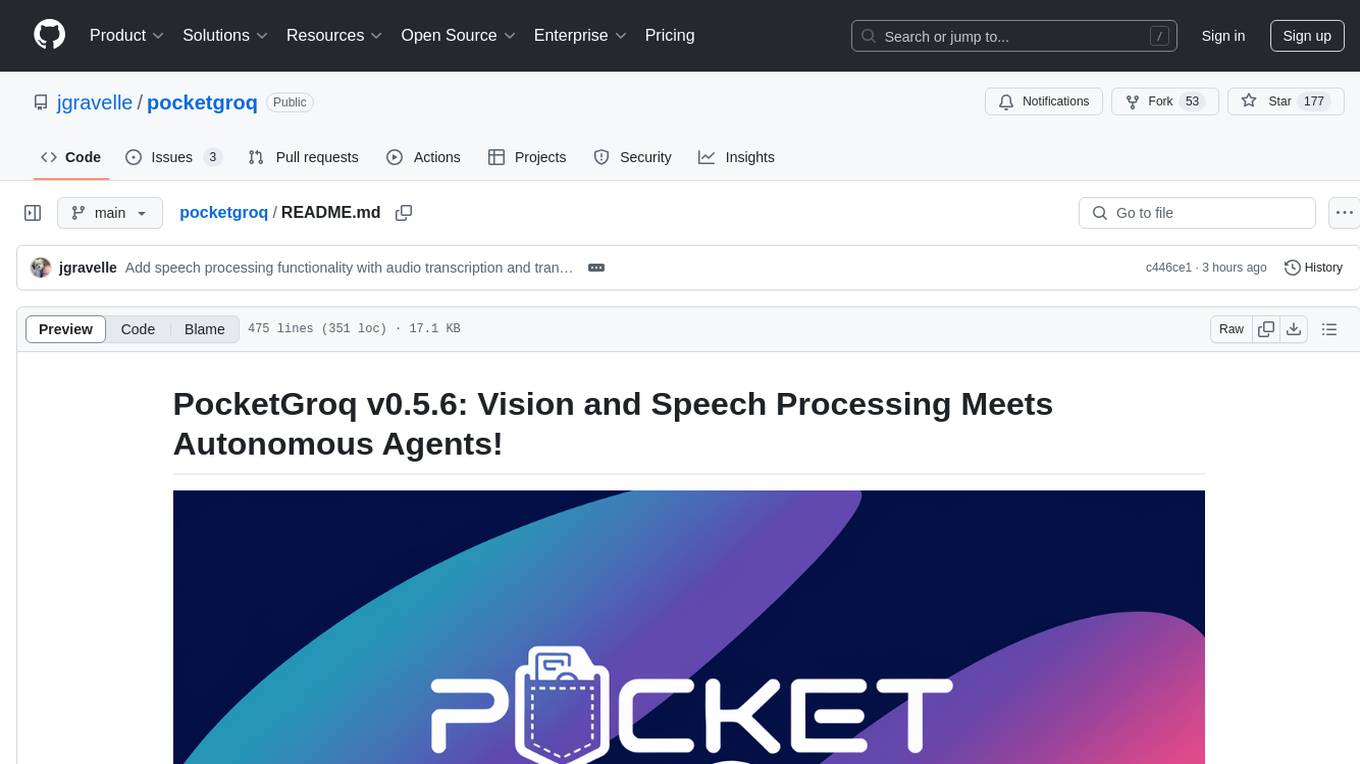
pocketgroq
PocketGroq is a tool that provides advanced functionalities for text generation, web scraping, web search, and AI response evaluation. It includes features like an Autonomous Agent for answering questions, web crawling and scraping capabilities, enhanced web search functionality, and flexible integration with Ollama server. Users can customize the agent's behavior, evaluate responses using AI, and utilize various methods for text generation, conversation management, and Chain of Thought reasoning. The tool offers comprehensive methods for different tasks, such as initializing RAG, error handling, and tool management. PocketGroq is designed to enhance development processes and enable the creation of AI-powered applications with ease.
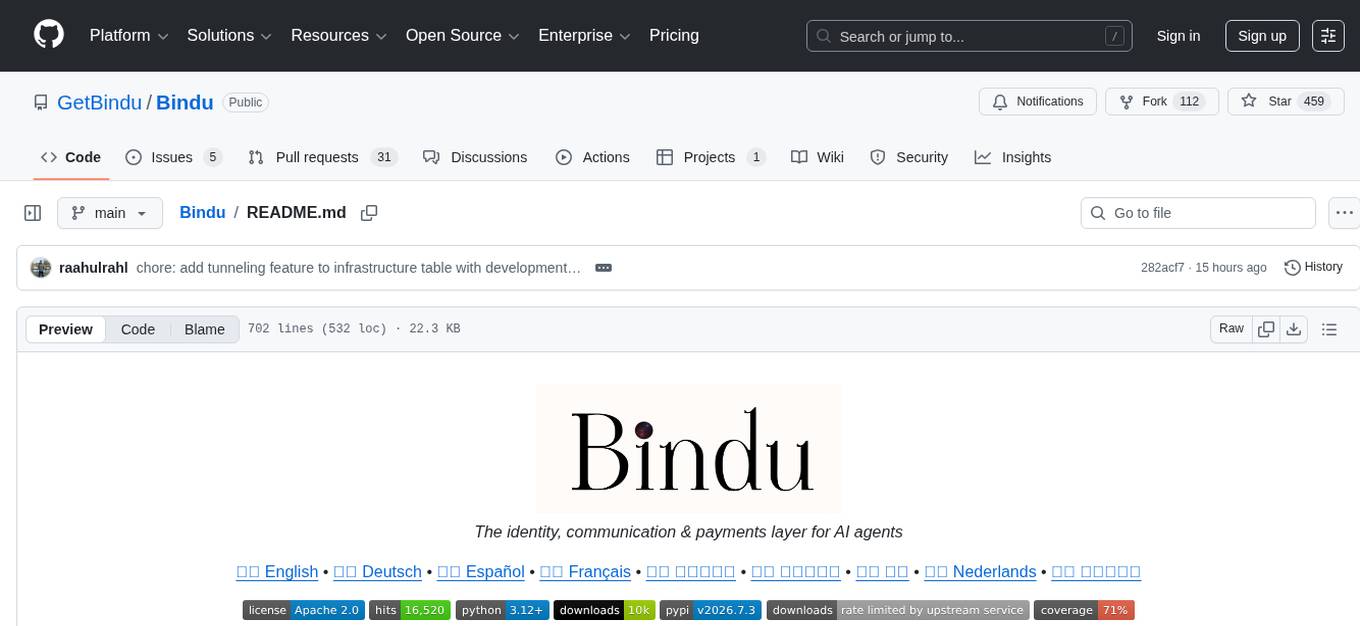
Bindu
Bindu is an operating layer for AI agents that provides identity, communication, and payment capabilities. It delivers a production-ready service with a convenient API to connect, authenticate, and orchestrate agents across distributed systems using open protocols: A2A, AP2, and X402. Built with a distributed architecture, Bindu makes it fast to develop and easy to integrate with any AI framework. Transform any agent framework into a fully interoperable service for communication, collaboration, and commerce in the Internet of Agents.
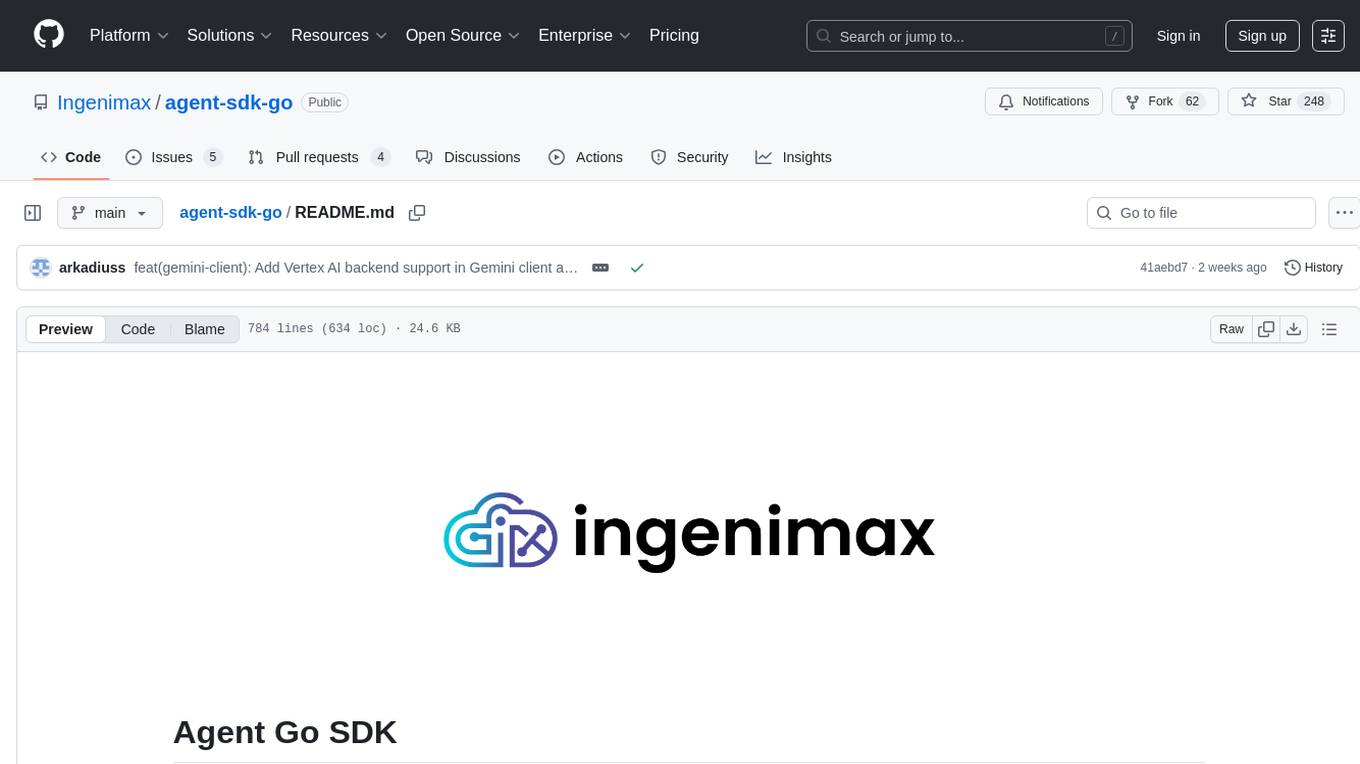
agent-sdk-go
Agent Go SDK is a powerful Go framework for building production-ready AI agents that seamlessly integrates memory management, tool execution, multi-LLM support, and enterprise features into a flexible, extensible architecture. It offers core capabilities like multi-model intelligence, modular tool ecosystem, advanced memory management, and MCP integration. The SDK is enterprise-ready with built-in guardrails, complete observability, and support for enterprise multi-tenancy. It provides a structured task framework, declarative configuration, and zero-effort bootstrapping for development experience. The SDK supports environment variables for configuration and includes features like creating agents with YAML configuration, auto-generating agent configurations, using MCP servers with an agent, and CLI tool for headless usage.
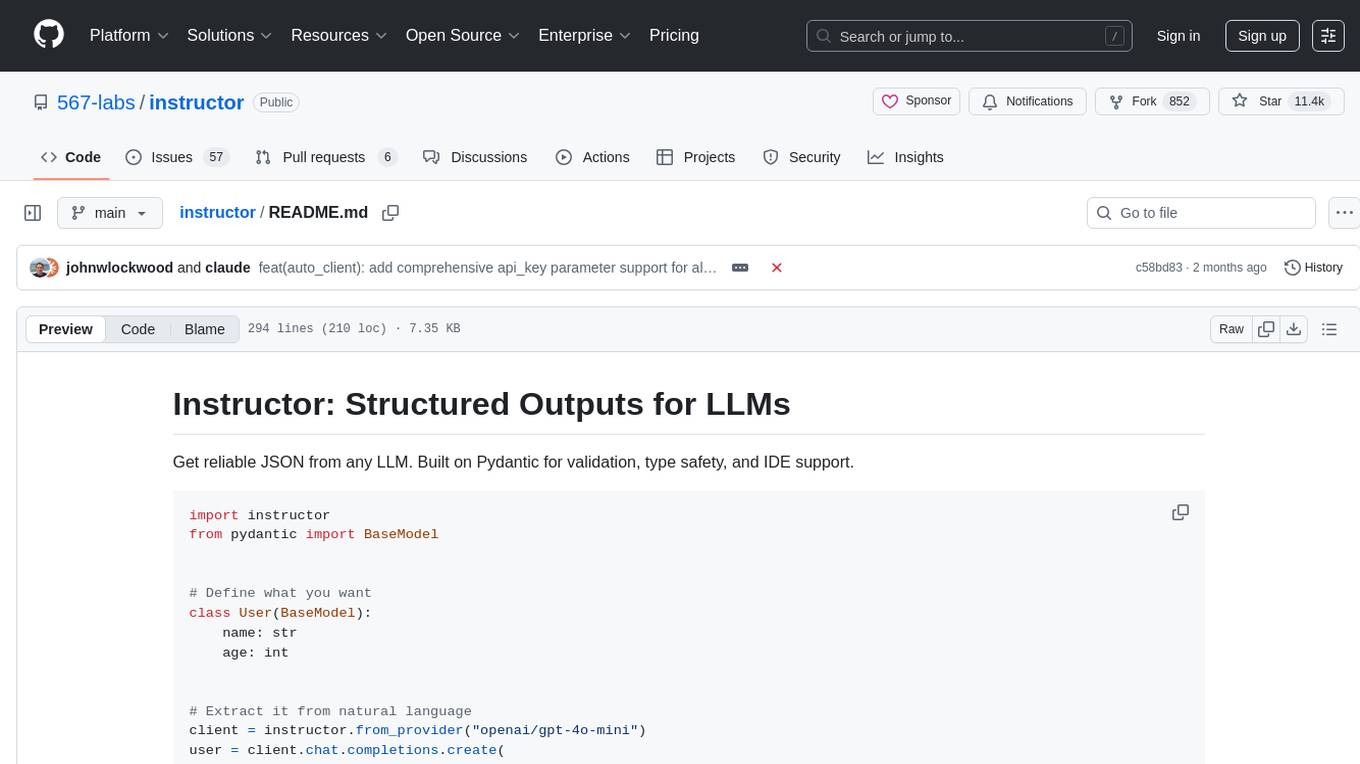
instructor
Instructor is a tool that provides structured outputs from Large Language Models (LLMs) in a reliable manner. It simplifies the process of extracting structured data by utilizing Pydantic for validation, type safety, and IDE support. With Instructor, users can define models and easily obtain structured data without the need for complex JSON parsing, error handling, or retries. The tool supports automatic retries, streaming support, and extraction of nested objects, making it production-ready for various AI applications. Trusted by a large community of developers and companies, Instructor is used by teams at OpenAI, Google, Microsoft, AWS, and YC startups.
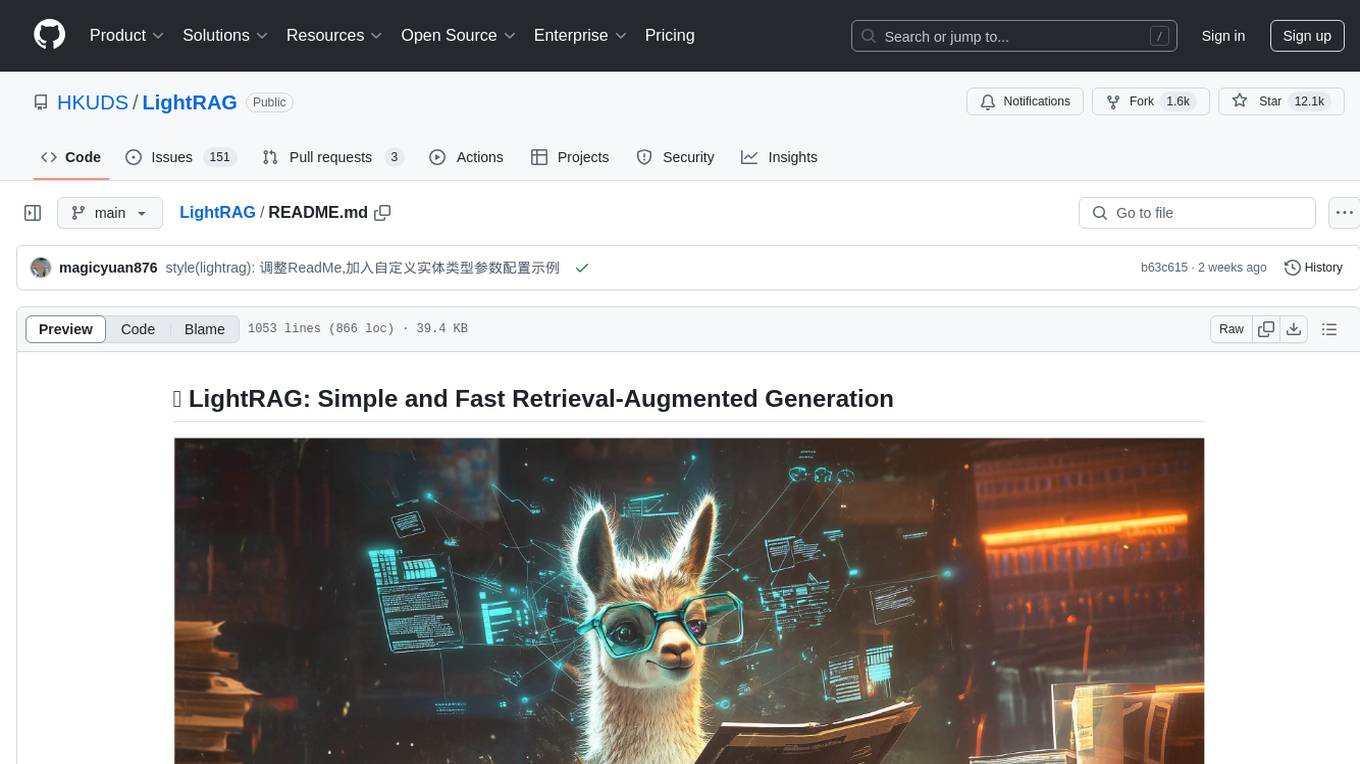
LightRAG
LightRAG is a repository hosting the code for LightRAG, a system that supports seamless integration of custom knowledge graphs, Oracle Database 23ai, Neo4J for storage, and multiple file types. It includes features like entity deletion, batch insert, incremental insert, and graph visualization. LightRAG provides an API server implementation for RESTful API access to RAG operations, allowing users to interact with it through HTTP requests. The repository also includes evaluation scripts, code for reproducing results, and a comprehensive code structure.
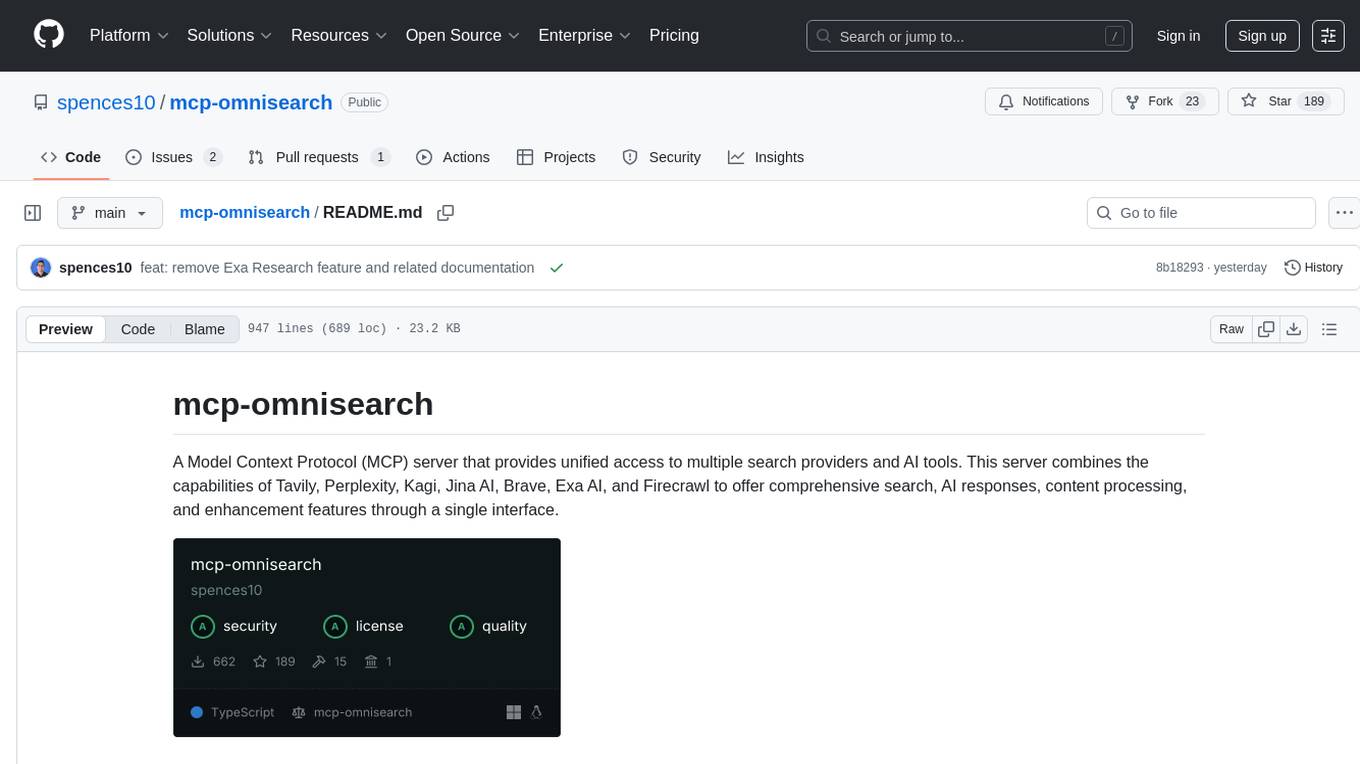
mcp-omnisearch
mcp-omnisearch is a Model Context Protocol (MCP) server that acts as a unified gateway to multiple search providers and AI tools. It integrates Tavily, Perplexity, Kagi, Jina AI, Brave, Exa AI, and Firecrawl to offer a wide range of search, AI response, content processing, and enhancement features through a single interface. The server provides powerful search capabilities, AI response generation, content extraction, summarization, web scraping, structured data extraction, and more. It is designed to work flexibly with the API keys available, enabling users to activate only the providers they have keys for and easily add more as needed.
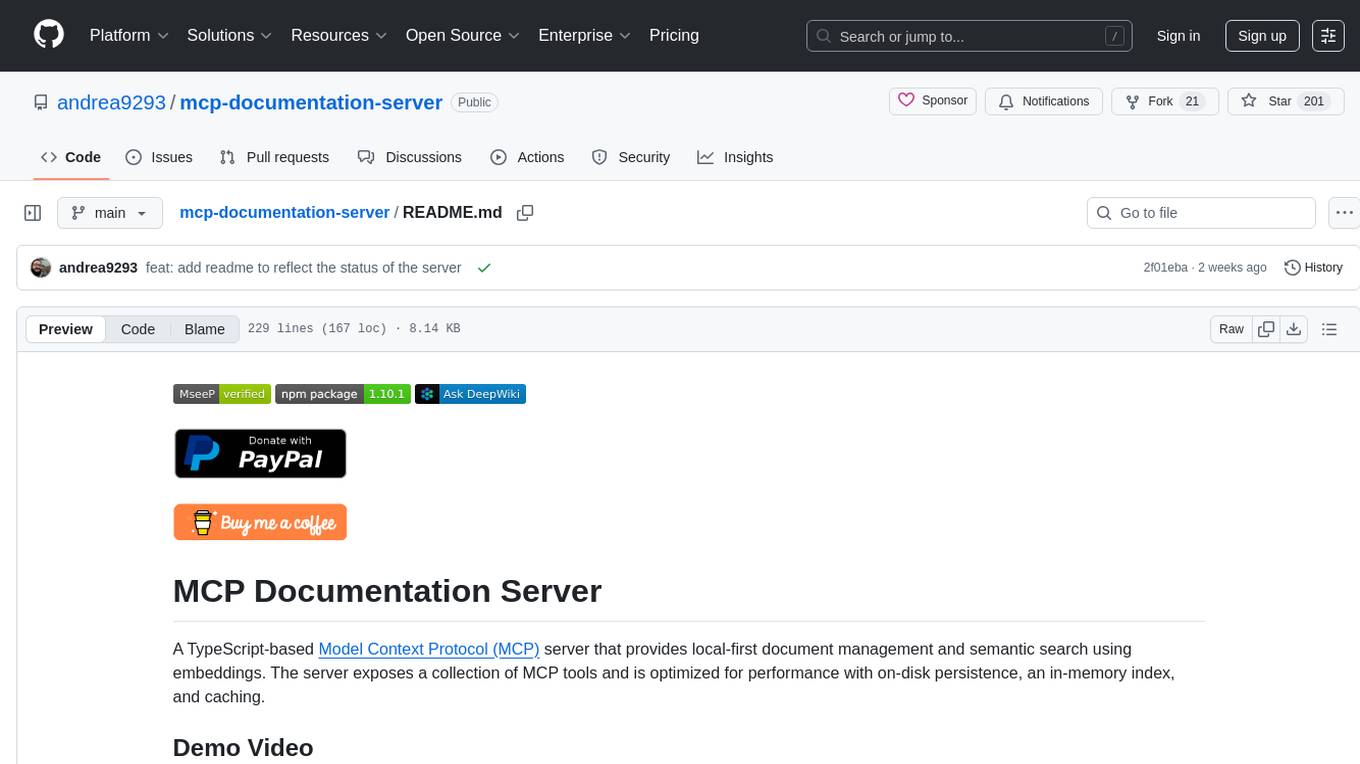
mcp-documentation-server
The mcp-documentation-server is a lightweight server application designed to serve documentation files for projects. It provides a simple and efficient way to host and access project documentation, making it easy for team members and stakeholders to find and reference important information. The server supports various file formats, such as markdown and HTML, and allows for easy navigation through the documentation. With mcp-documentation-server, teams can streamline their documentation process and ensure that project information is easily accessible to all involved parties.
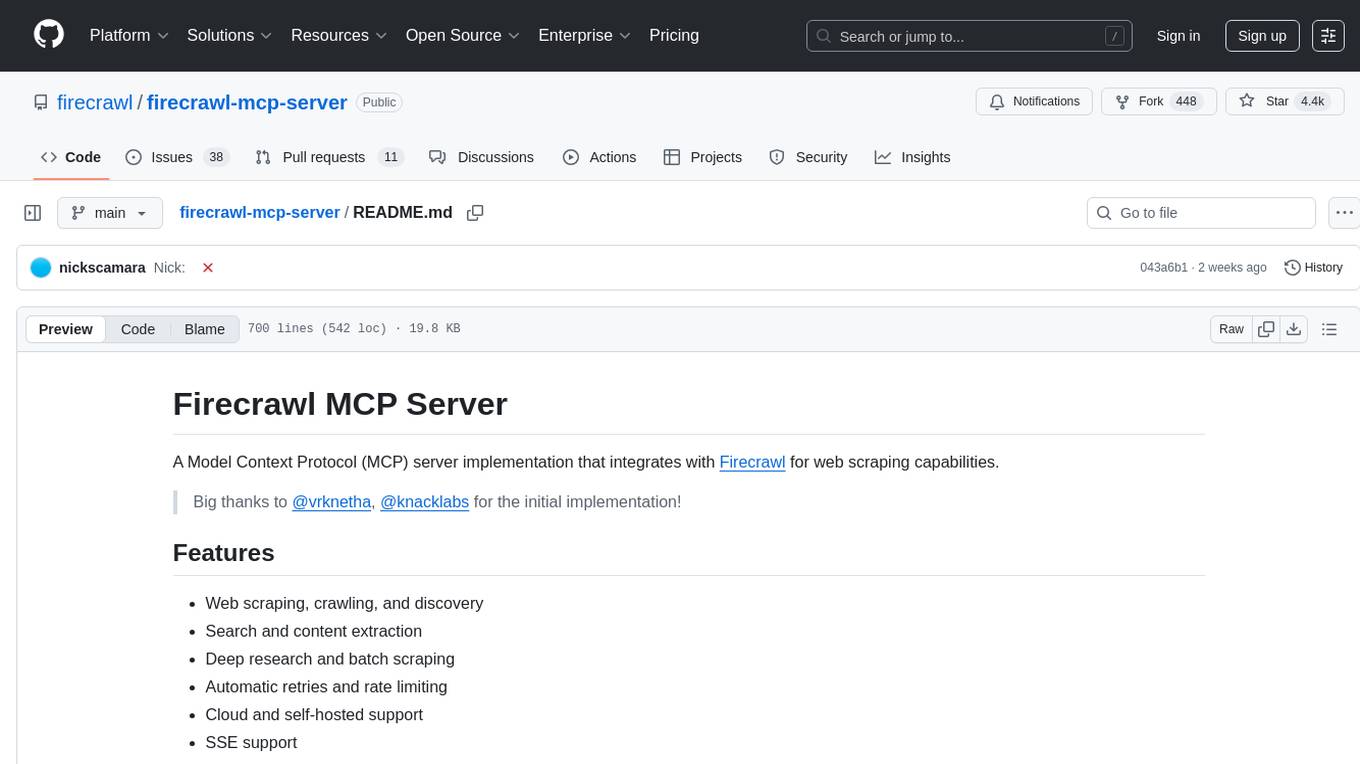
firecrawl-mcp-server
Firecrawl MCP Server is a Model Context Protocol (MCP) server implementation that integrates with Firecrawl for web scraping capabilities. It offers features such as web scraping, crawling, and discovery, search and content extraction, deep research and batch scraping, automatic retries and rate limiting, cloud and self-hosted support, and SSE support. The server can be configured to run with various tools like Cursor, Windsurf, SSE Local Mode, Smithery, and VS Code. It supports environment variables for cloud API and optional configurations for retry settings and credit usage monitoring. The server includes tools for scraping, batch scraping, mapping, searching, crawling, and extracting structured data from web pages. It provides detailed logging and error handling functionalities for robust performance.
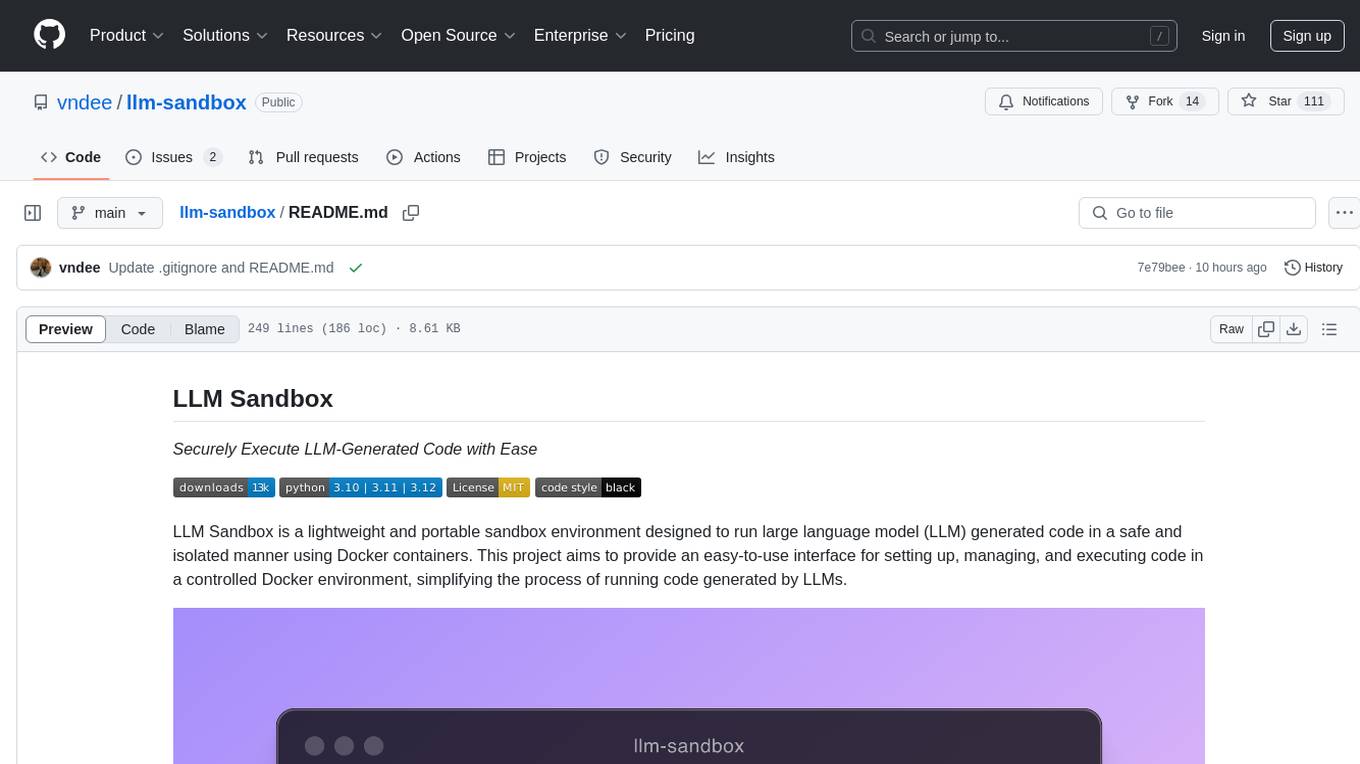
llm-sandbox
LLM Sandbox is a lightweight and portable sandbox environment designed to securely execute large language model (LLM) generated code in a safe and isolated manner using Docker containers. It provides an easy-to-use interface for setting up, managing, and executing code in a controlled Docker environment, simplifying the process of running code generated by LLMs. The tool supports multiple programming languages, offers flexibility with predefined Docker images or custom Dockerfiles, and allows scalability with support for Kubernetes and remote Docker hosts.
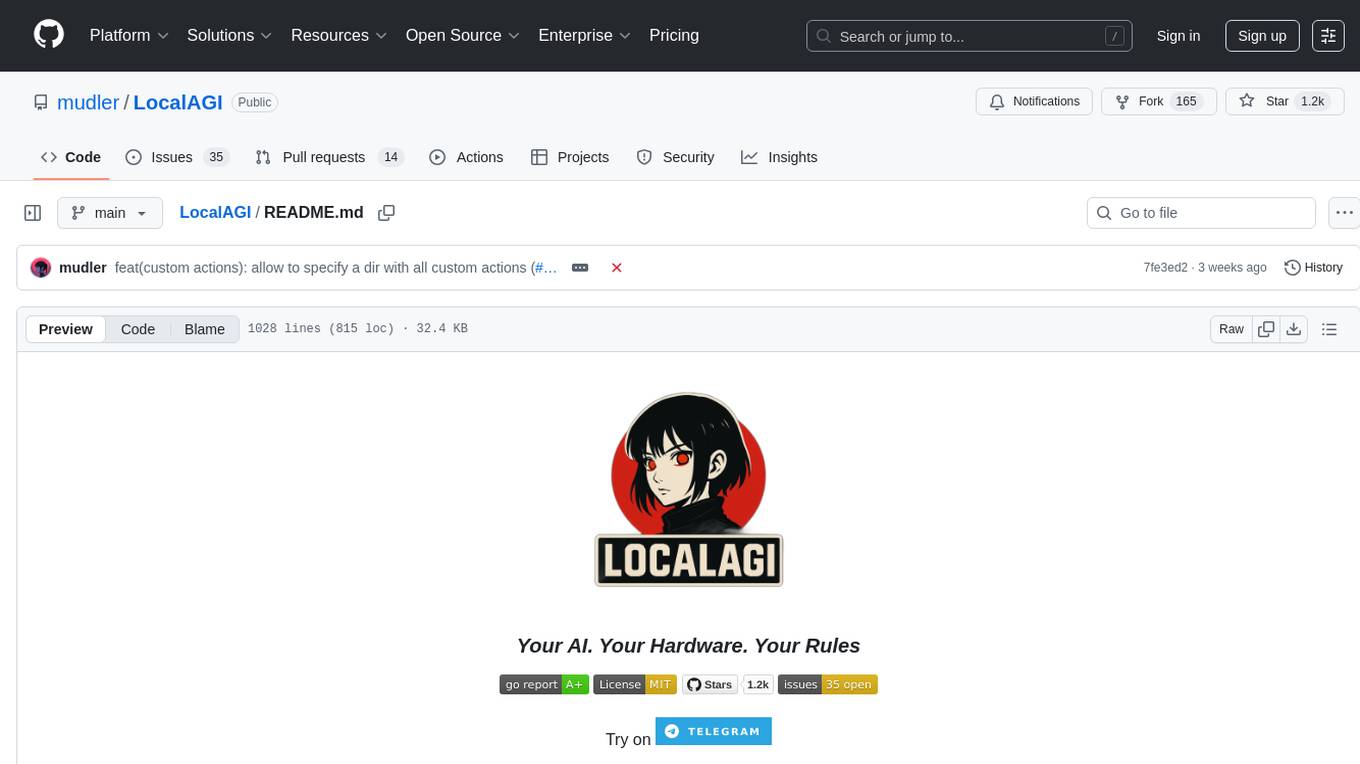
LocalAGI
LocalAGI is a powerful, self-hostable AI Agent platform that allows you to design AI automations without writing code. It provides a complete drop-in replacement for OpenAI's Responses APIs with advanced agentic capabilities. With LocalAGI, you can create customizable AI assistants, automations, chat bots, and agents that run 100% locally, without the need for cloud services or API keys. The platform offers features like no-code agents, web-based interface, advanced agent teaming, connectors for various platforms, comprehensive REST API, short & long-term memory capabilities, planning & reasoning, periodic tasks scheduling, memory management, multimodal support, extensible custom actions, fully customizable models, observability, and more.
aiavatarkit
AIAvatarKit is a tool for building AI-based conversational avatars quickly. It supports various platforms like VRChat and cluster, along with real-world devices. The tool is extensible, allowing unlimited capabilities based on user needs. It requires VOICEVOX API, Google or Azure Speech Services API keys, and Python 3.10. Users can start conversations out of the box and enjoy seamless interactions with the avatars.
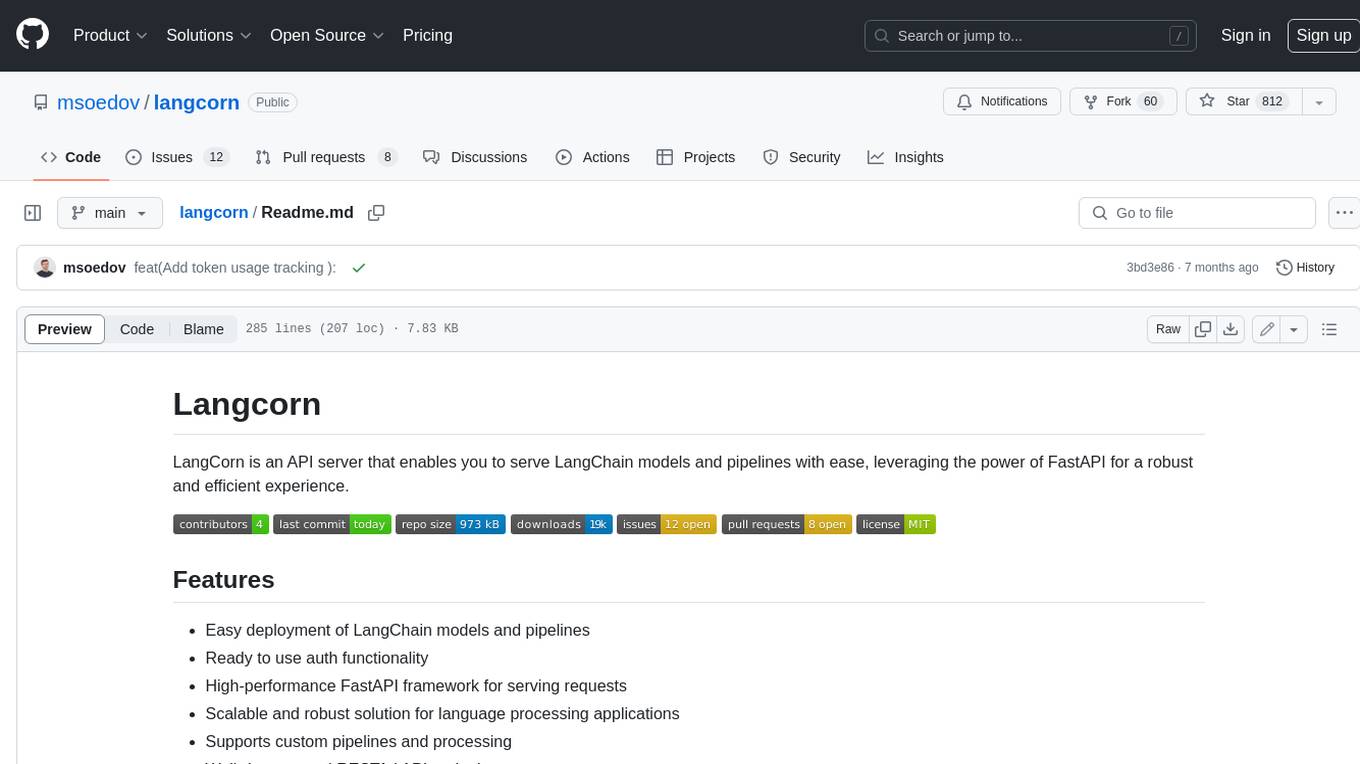
langcorn
LangCorn is an API server that enables you to serve LangChain models and pipelines with ease, leveraging the power of FastAPI for a robust and efficient experience. It offers features such as easy deployment of LangChain models and pipelines, ready-to-use authentication functionality, high-performance FastAPI framework for serving requests, scalability and robustness for language processing applications, support for custom pipelines and processing, well-documented RESTful API endpoints, and asynchronous processing for faster response times.
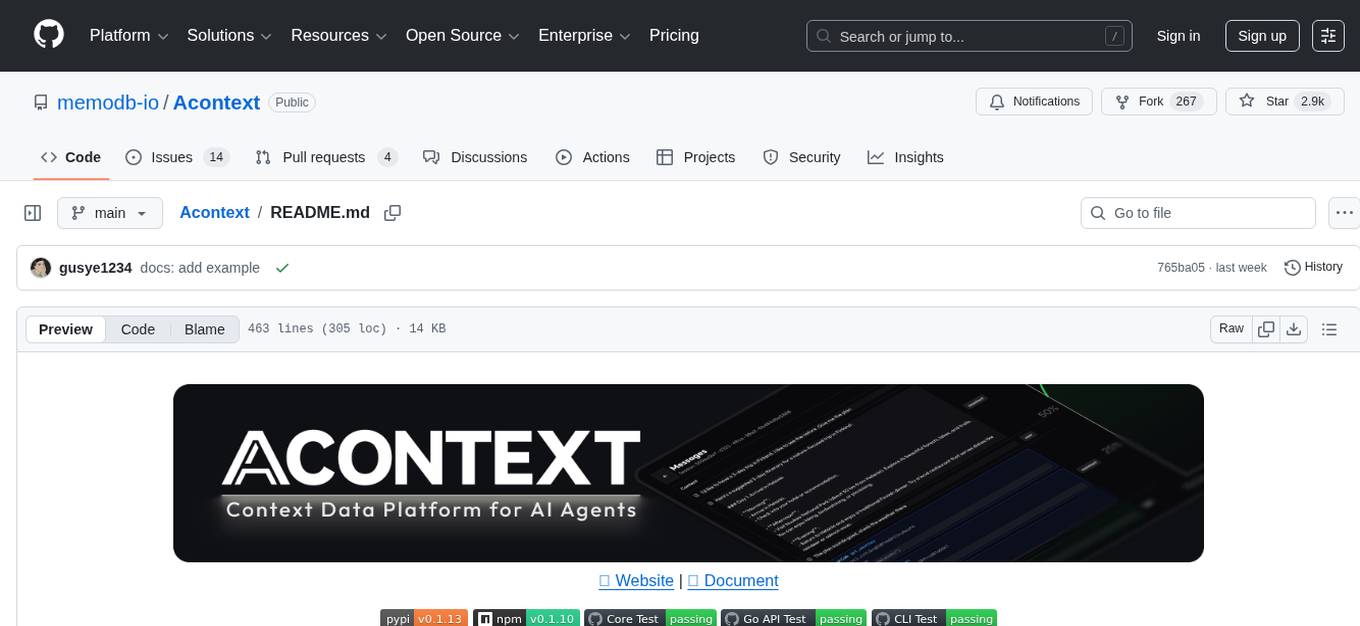
Acontext
Acontext is a context data platform designed for production AI agents, offering unified storage, built-in context management, and observability features. It helps agents scale from local demos to production without the need to rebuild context infrastructure. The platform provides solutions for challenges like scattered context data, long-running agents requiring context management, and tracking states from multi-modal agents. Acontext offers core features such as context storage, session management, disk storage, agent skills management, and sandbox for code execution and analysis. Users can connect to Acontext, install SDKs, initialize clients, store and retrieve messages, perform context engineering, and utilize agent storage tools. The platform also supports building agents using end-to-end scripts in Python and Typescript, with various templates available. Acontext's architecture includes client layer, backend with API and core components, infrastructure with PostgreSQL, S3, Redis, and RabbitMQ, and a web dashboard. Join the Acontext community on Discord and follow updates on GitHub.
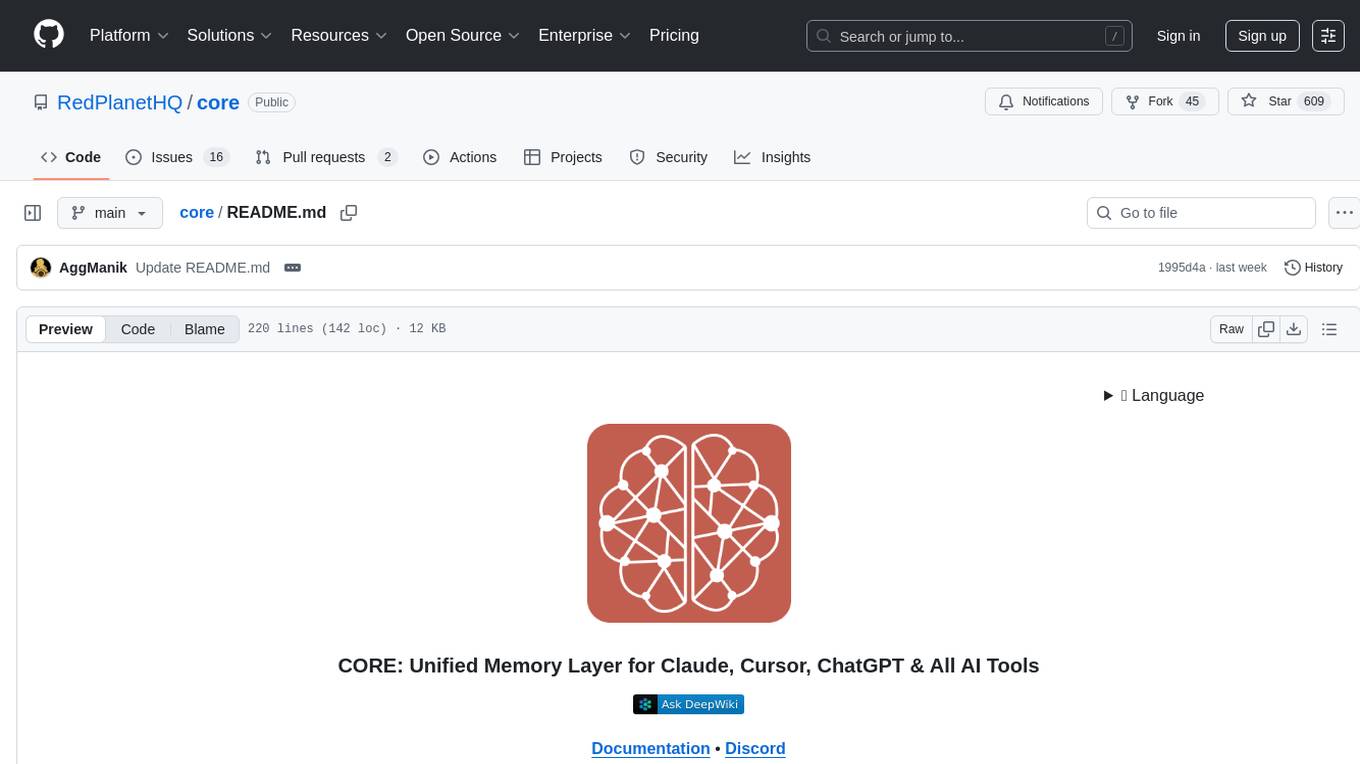
core
CORE is an open-source unified, persistent memory layer for all AI tools, allowing developers to maintain context across different tools like Cursor, ChatGPT, and Claude. It aims to solve the issue of context switching and information loss between sessions by creating a knowledge graph that remembers conversations, decisions, and insights. With features like unified memory, temporal knowledge graph, browser extension, chat with memory, auto-sync from apps, and MCP integration hub, CORE provides a seamless experience for managing and recalling context. The tool's ingestion pipeline captures evolving context through normalization, extraction, resolution, and graph integration, resulting in a dynamic memory that grows and changes with the user. When recalling from memory, CORE utilizes search, re-ranking, filtering, and output to provide relevant and contextual answers. Security measures include data encryption, authentication, access control, and vulnerability reporting.
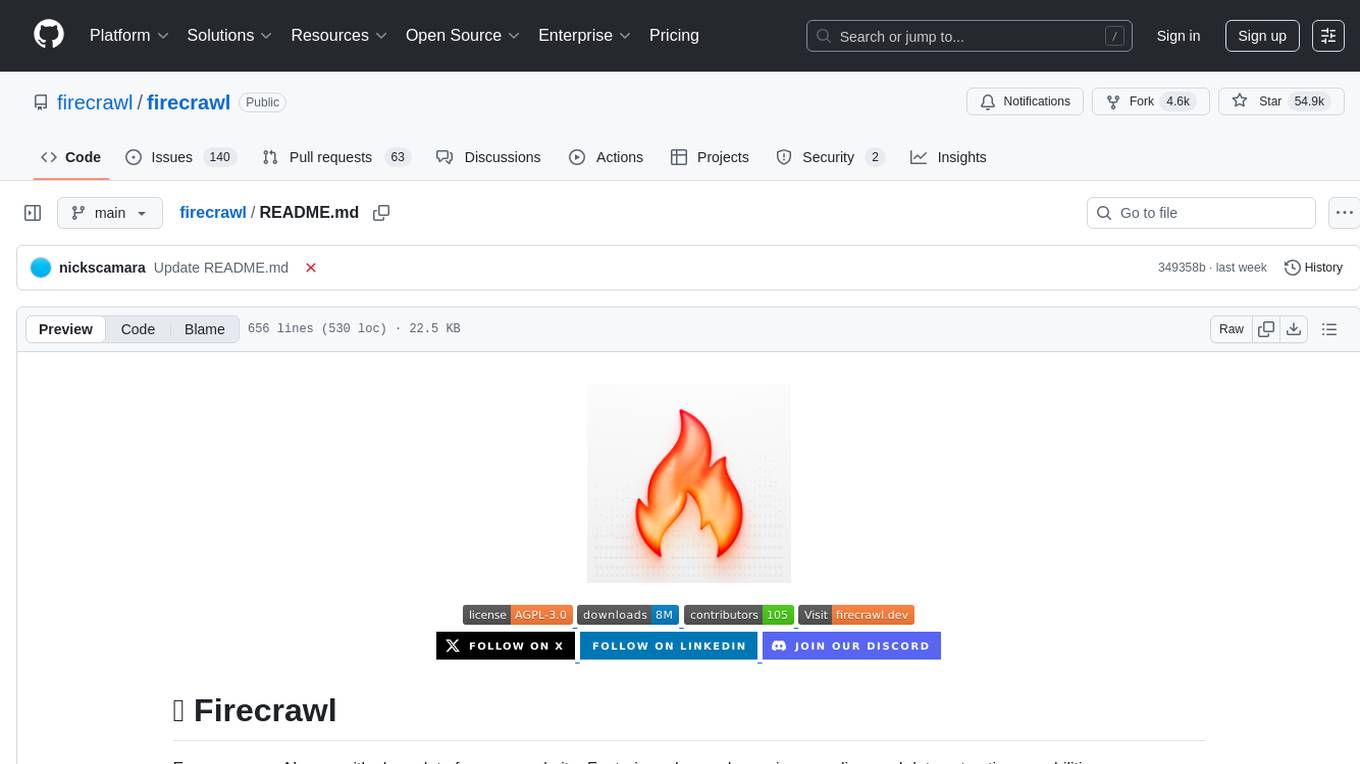
firecrawl
Firecrawl is an API service that empowers AI applications with clean data from any website. It features advanced scraping, crawling, and data extraction capabilities. The repository is still in development, integrating custom modules into the mono repo. Users can run it locally but it's not fully ready for self-hosted deployment yet. Firecrawl offers powerful capabilities like scraping, crawling, mapping, searching, and extracting structured data from single pages, multiple pages, or entire websites with AI. It supports various formats, actions, and batch scraping. The tool is designed to handle proxies, anti-bot mechanisms, dynamic content, media parsing, change tracking, and more. Firecrawl is available as an open-source project under the AGPL-3.0 license, with additional features offered in the cloud version.
For similar tasks
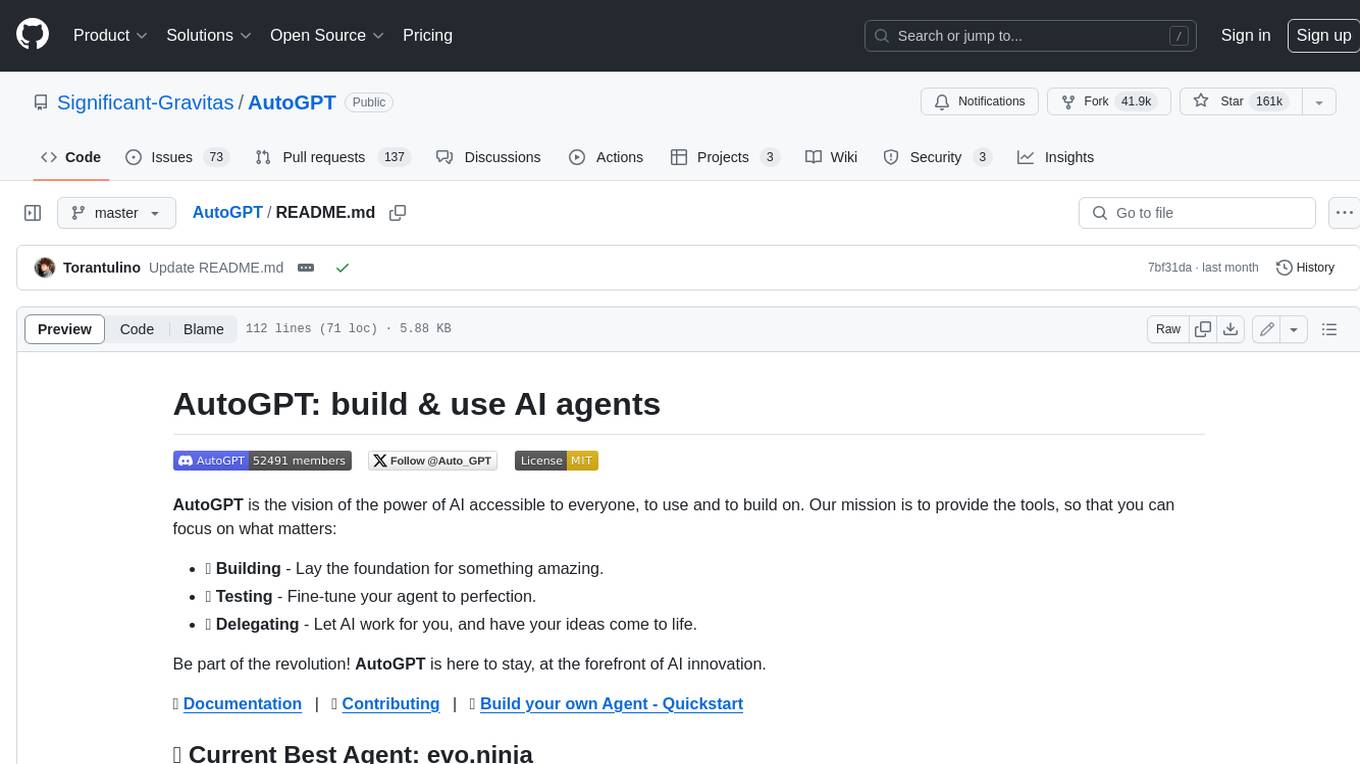
AutoGPT
AutoGPT is a revolutionary tool that empowers everyone to harness the power of AI. With AutoGPT, you can effortlessly build, test, and delegate tasks to AI agents, unlocking a world of possibilities. Our mission is to provide the tools you need to focus on what truly matters: innovation and creativity.
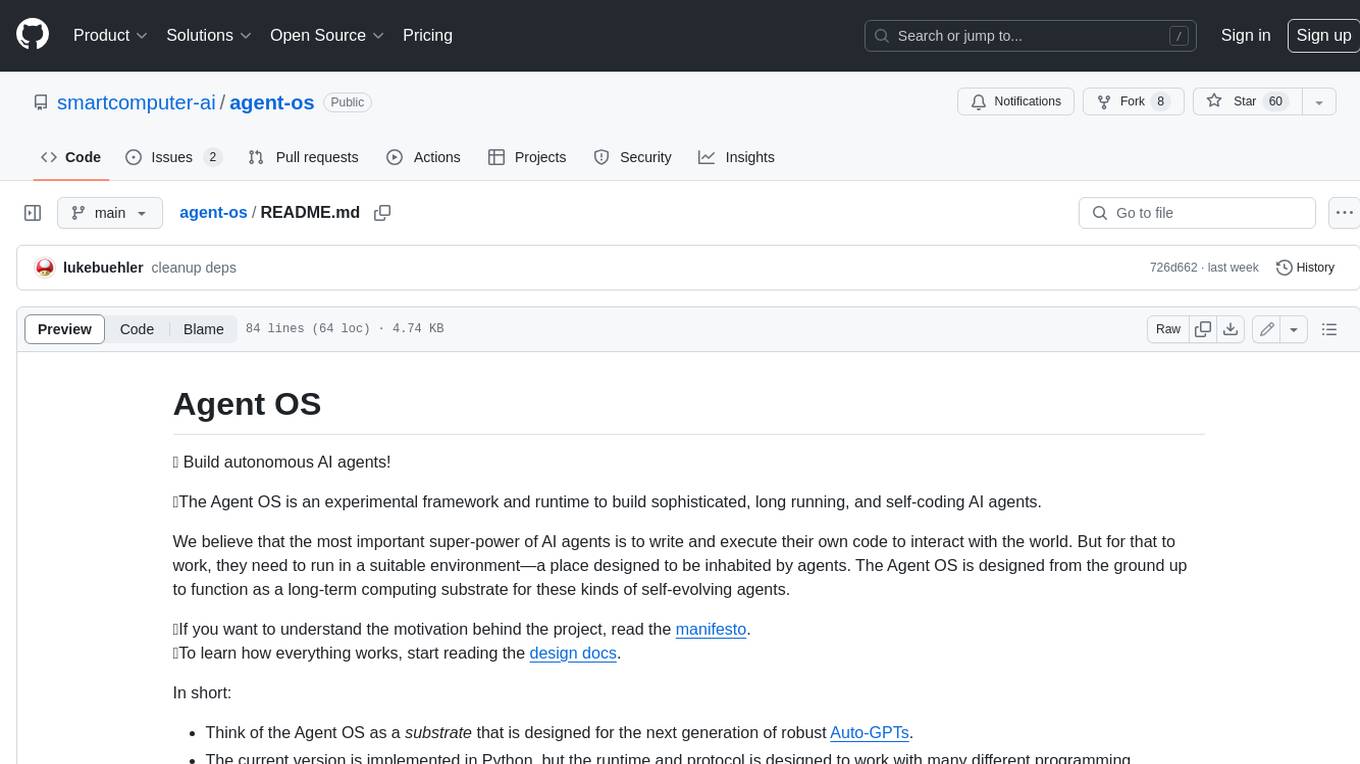
agent-os
The Agent OS is an experimental framework and runtime to build sophisticated, long running, and self-coding AI agents. We believe that the most important super-power of AI agents is to write and execute their own code to interact with the world. But for that to work, they need to run in a suitable environment—a place designed to be inhabited by agents. The Agent OS is designed from the ground up to function as a long-term computing substrate for these kinds of self-evolving agents.
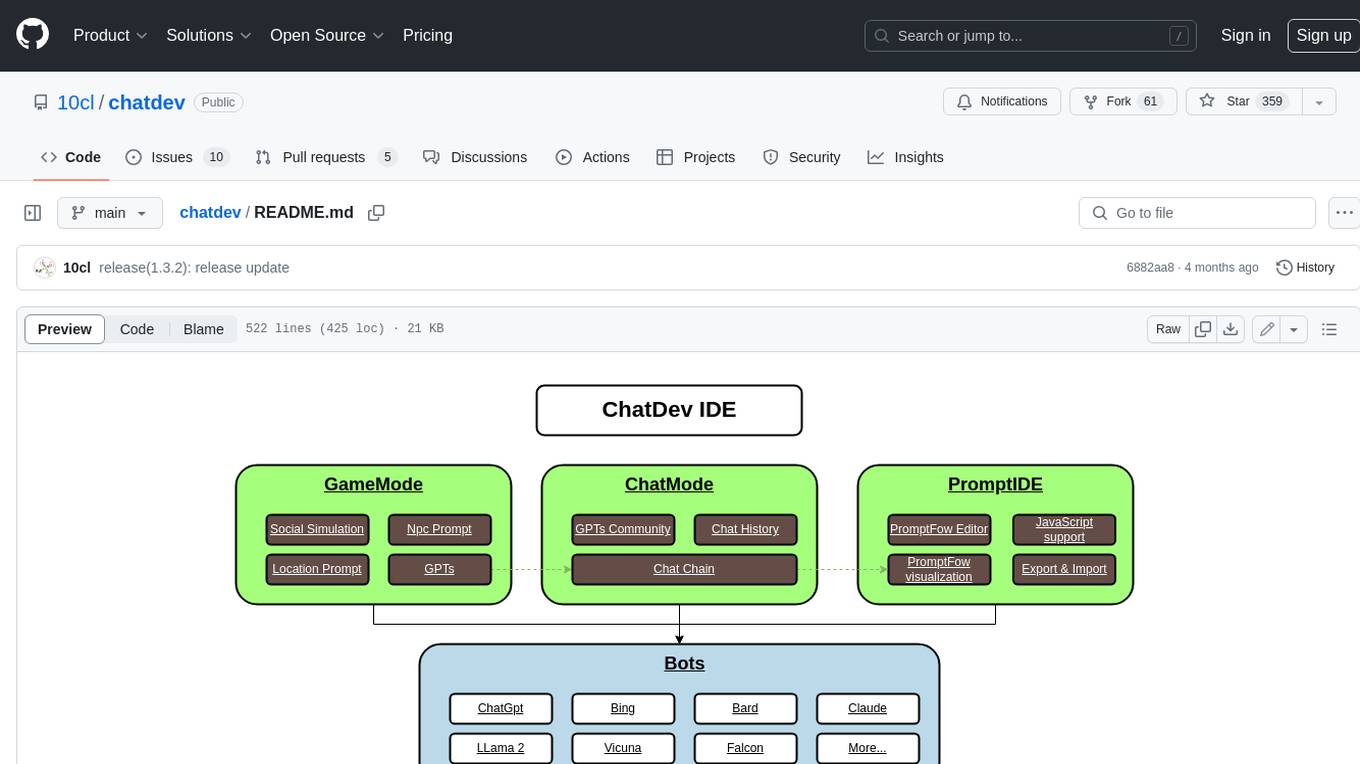
chatdev
ChatDev IDE is a tool for building your AI agent, Whether it's NPCs in games or powerful agent tools, you can design what you want for this platform. It accelerates prompt engineering through **JavaScript Support** that allows implementing complex prompting techniques.
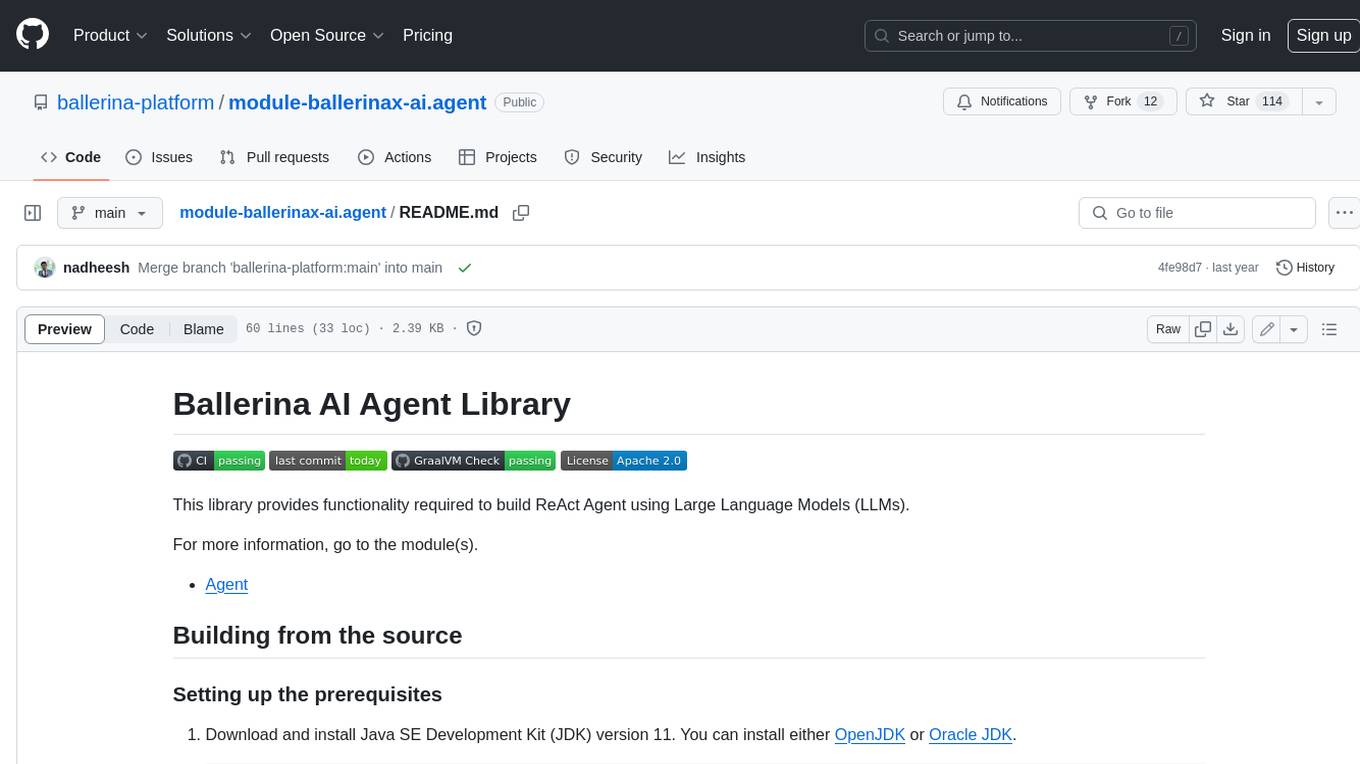
module-ballerinax-ai.agent
This library provides functionality required to build ReAct Agent using Large Language Models (LLMs).
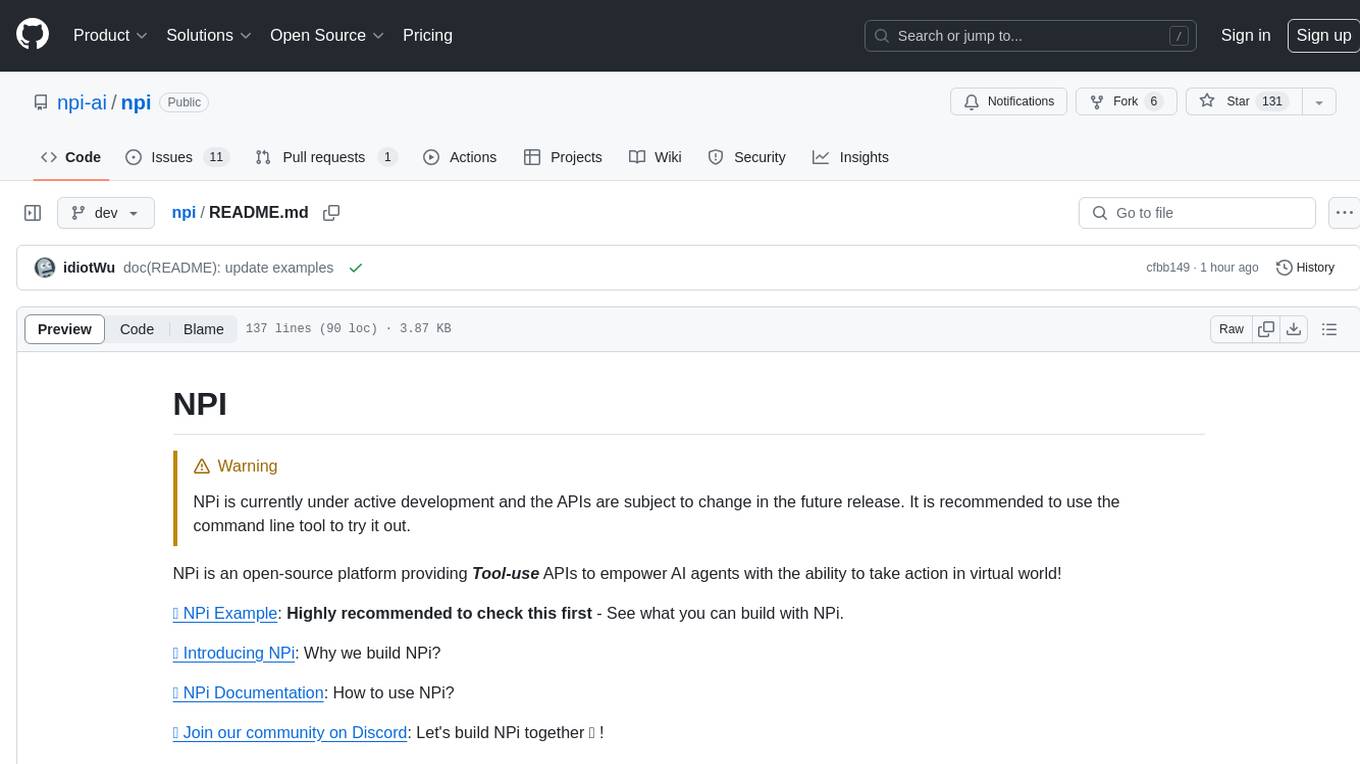
npi
NPi is an open-source platform providing Tool-use APIs to empower AI agents with the ability to take action in the virtual world. It is currently under active development, and the APIs are subject to change in future releases. NPi offers a command line tool for installation and setup, along with a GitHub app for easy access to repositories. The platform also includes a Python SDK and examples like Calendar Negotiator and Twitter Crawler. Join the NPi community on Discord to contribute to the development and explore the roadmap for future enhancements.
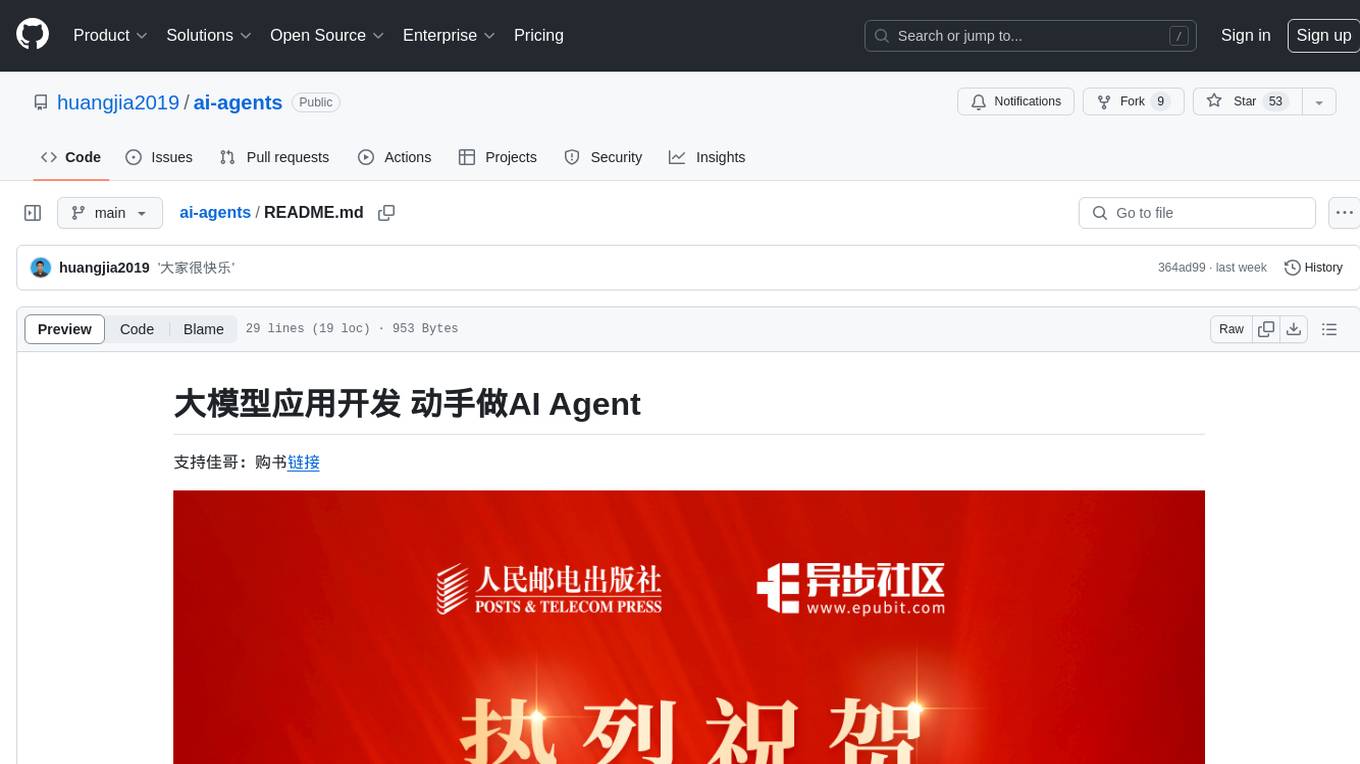
ai-agents
The 'ai-agents' repository is a collection of books and resources focused on developing AI agents, including topics such as GPT models, building AI agents from scratch, machine learning theory and practice, and basic methods and tools for data analysis. The repository provides detailed explanations and guidance for individuals interested in learning about and working with AI agents.
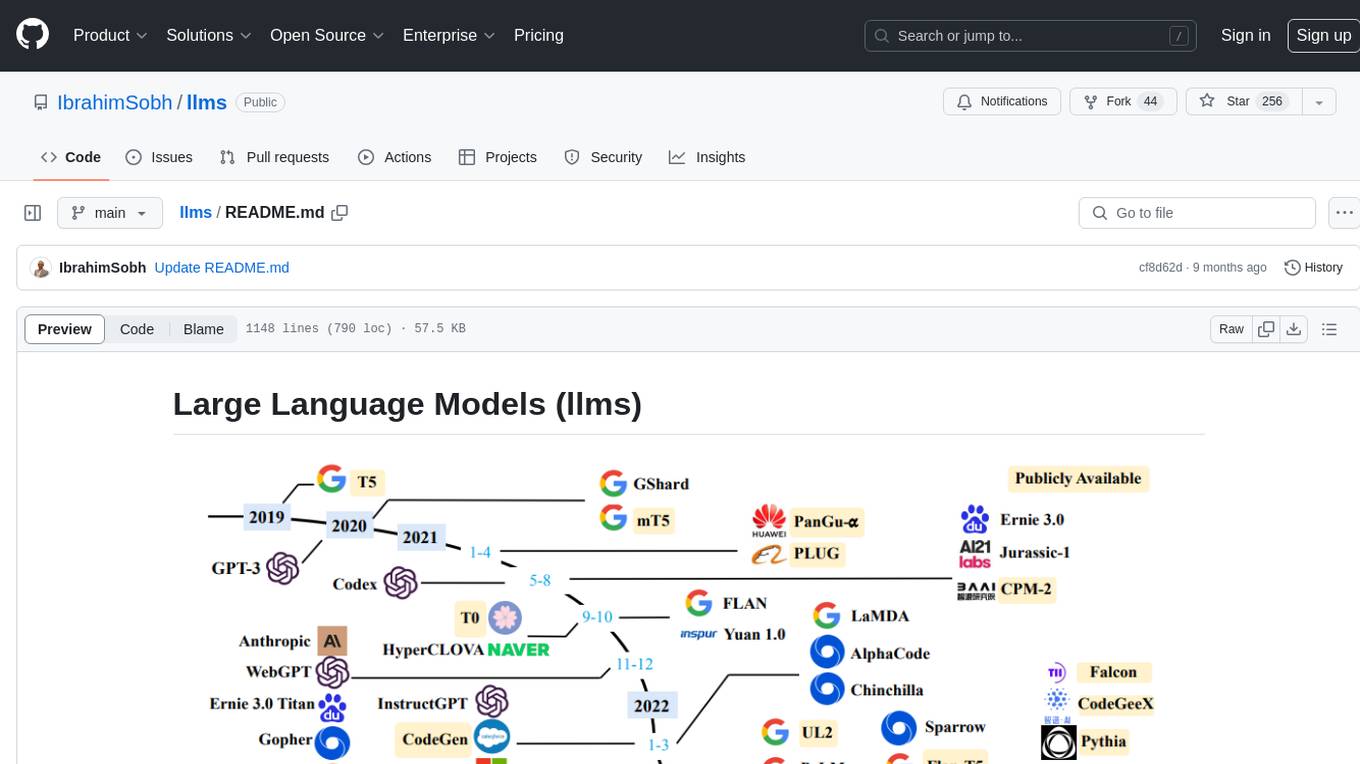
llms
The 'llms' repository is a comprehensive guide on Large Language Models (LLMs), covering topics such as language modeling, applications of LLMs, statistical language modeling, neural language models, conditional language models, evaluation methods, transformer-based language models, practical LLMs like GPT and BERT, prompt engineering, fine-tuning LLMs, retrieval augmented generation, AI agents, and LLMs for computer vision. The repository provides detailed explanations, examples, and tools for working with LLMs.
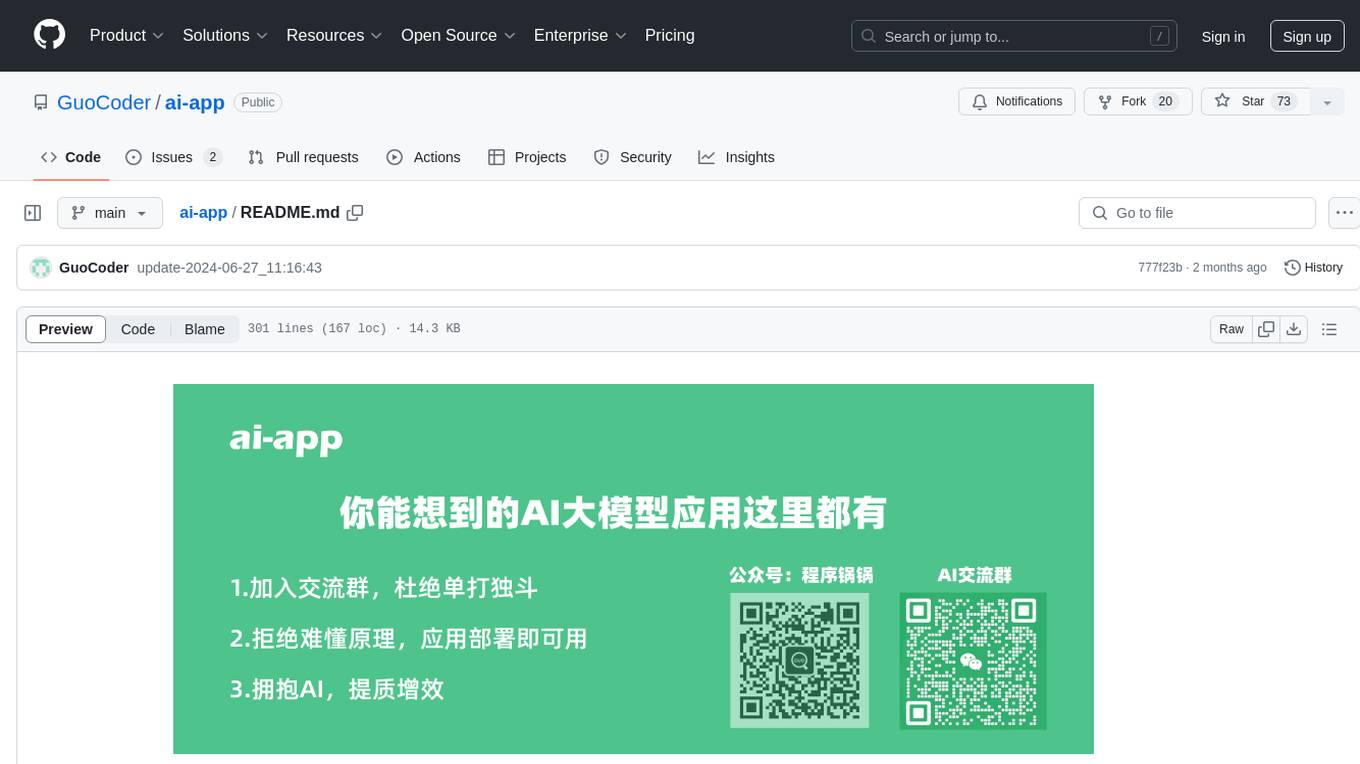
ai-app
The 'ai-app' repository is a comprehensive collection of tools and resources related to artificial intelligence, focusing on topics such as server environment setup, PyCharm and Anaconda installation, large model deployment and training, Transformer principles, RAG technology, vector databases, AI image, voice, and music generation, and AI Agent frameworks. It also includes practical guides and tutorials on implementing various AI applications. The repository serves as a valuable resource for individuals interested in exploring different aspects of AI technology.
For similar jobs

sweep
Sweep is an AI junior developer that turns bugs and feature requests into code changes. It automatically handles developer experience improvements like adding type hints and improving test coverage.

teams-ai
The Teams AI Library is a software development kit (SDK) that helps developers create bots that can interact with Teams and Microsoft 365 applications. It is built on top of the Bot Framework SDK and simplifies the process of developing bots that interact with Teams' artificial intelligence capabilities. The SDK is available for JavaScript/TypeScript, .NET, and Python.

ai-guide
This guide is dedicated to Large Language Models (LLMs) that you can run on your home computer. It assumes your PC is a lower-end, non-gaming setup.

classifai
Supercharge WordPress Content Workflows and Engagement with Artificial Intelligence. Tap into leading cloud-based services like OpenAI, Microsoft Azure AI, Google Gemini and IBM Watson to augment your WordPress-powered websites. Publish content faster while improving SEO performance and increasing audience engagement. ClassifAI integrates Artificial Intelligence and Machine Learning technologies to lighten your workload and eliminate tedious tasks, giving you more time to create original content that matters.

chatbot-ui
Chatbot UI is an open-source AI chat app that allows users to create and deploy their own AI chatbots. It is easy to use and can be customized to fit any need. Chatbot UI is perfect for businesses, developers, and anyone who wants to create a chatbot.

BricksLLM
BricksLLM is a cloud native AI gateway written in Go. Currently, it provides native support for OpenAI, Anthropic, Azure OpenAI and vLLM. BricksLLM aims to provide enterprise level infrastructure that can power any LLM production use cases. Here are some use cases for BricksLLM: * Set LLM usage limits for users on different pricing tiers * Track LLM usage on a per user and per organization basis * Block or redact requests containing PIIs * Improve LLM reliability with failovers, retries and caching * Distribute API keys with rate limits and cost limits for internal development/production use cases * Distribute API keys with rate limits and cost limits for students

uAgents
uAgents is a Python library developed by Fetch.ai that allows for the creation of autonomous AI agents. These agents can perform various tasks on a schedule or take action on various events. uAgents are easy to create and manage, and they are connected to a fast-growing network of other uAgents. They are also secure, with cryptographically secured messages and wallets.

griptape
Griptape is a modular Python framework for building AI-powered applications that securely connect to your enterprise data and APIs. It offers developers the ability to maintain control and flexibility at every step. Griptape's core components include Structures (Agents, Pipelines, and Workflows), Tasks, Tools, Memory (Conversation Memory, Task Memory, and Meta Memory), Drivers (Prompt and Embedding Drivers, Vector Store Drivers, Image Generation Drivers, Image Query Drivers, SQL Drivers, Web Scraper Drivers, and Conversation Memory Drivers), Engines (Query Engines, Extraction Engines, Summary Engines, Image Generation Engines, and Image Query Engines), and additional components (Rulesets, Loaders, Artifacts, Chunkers, and Tokenizers). Griptape enables developers to create AI-powered applications with ease and efficiency.






